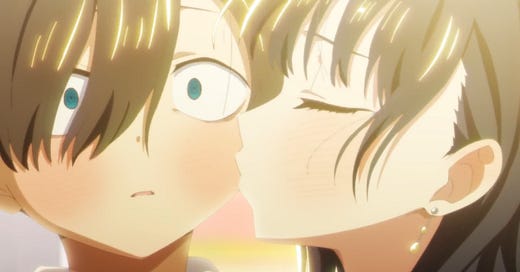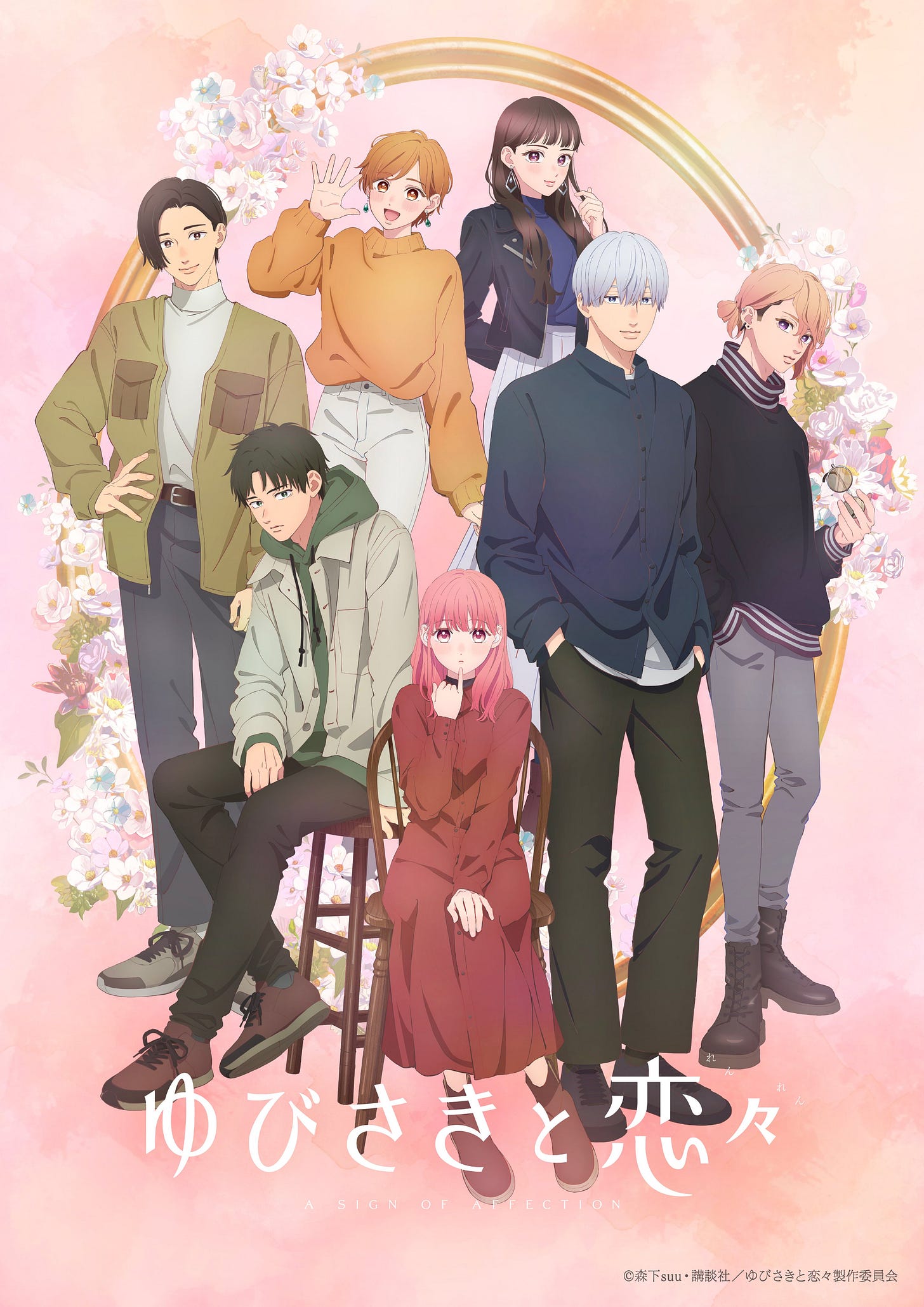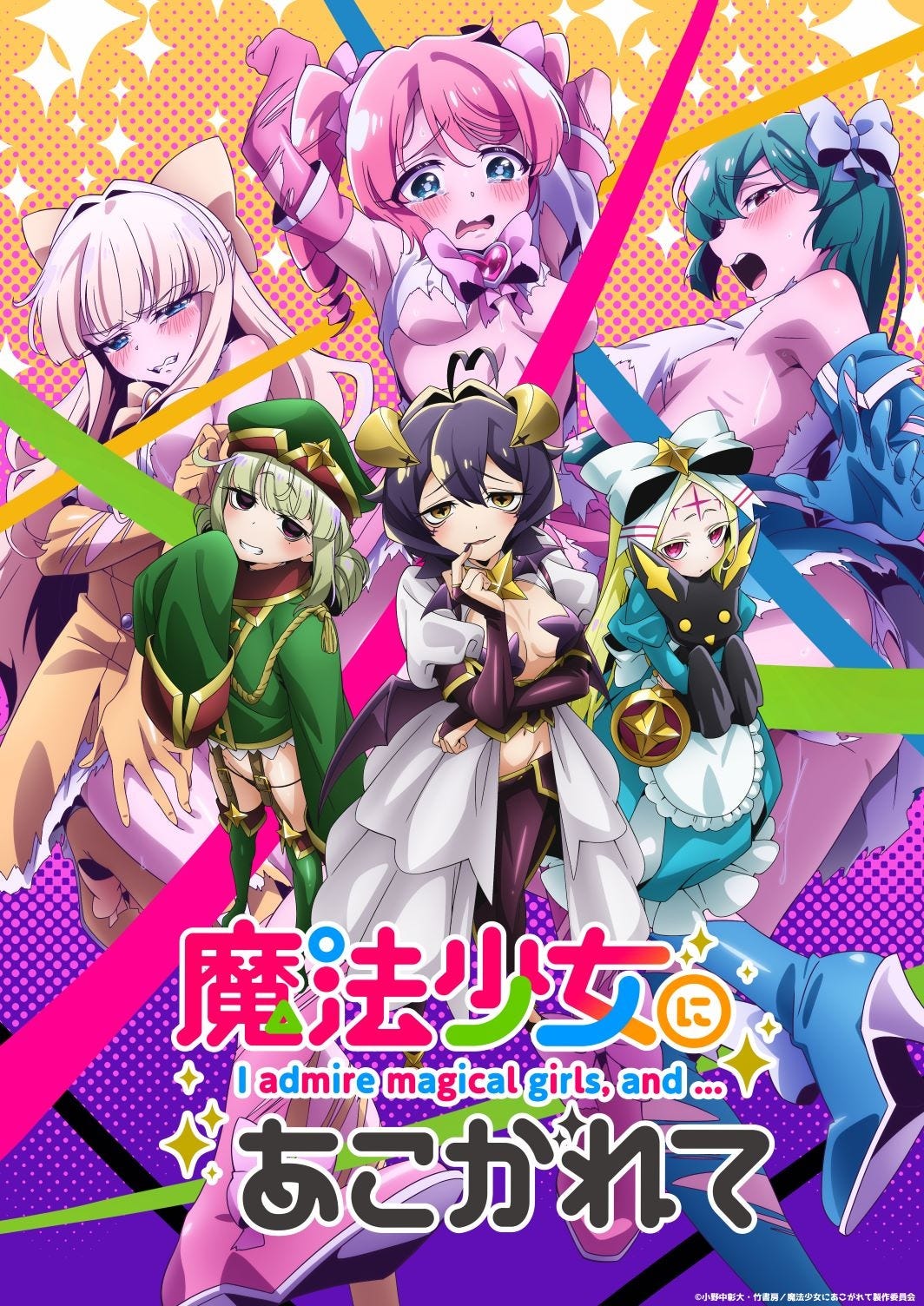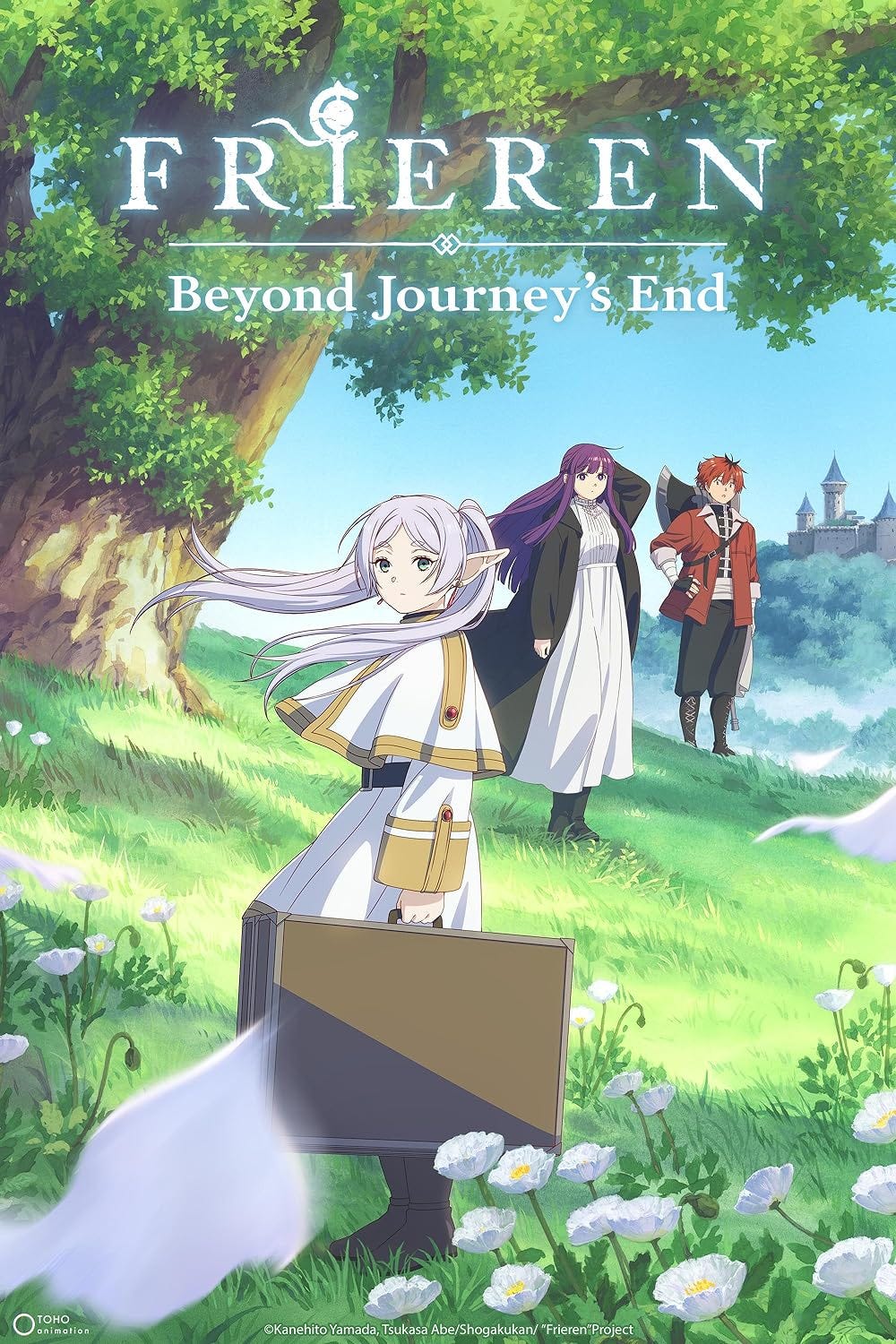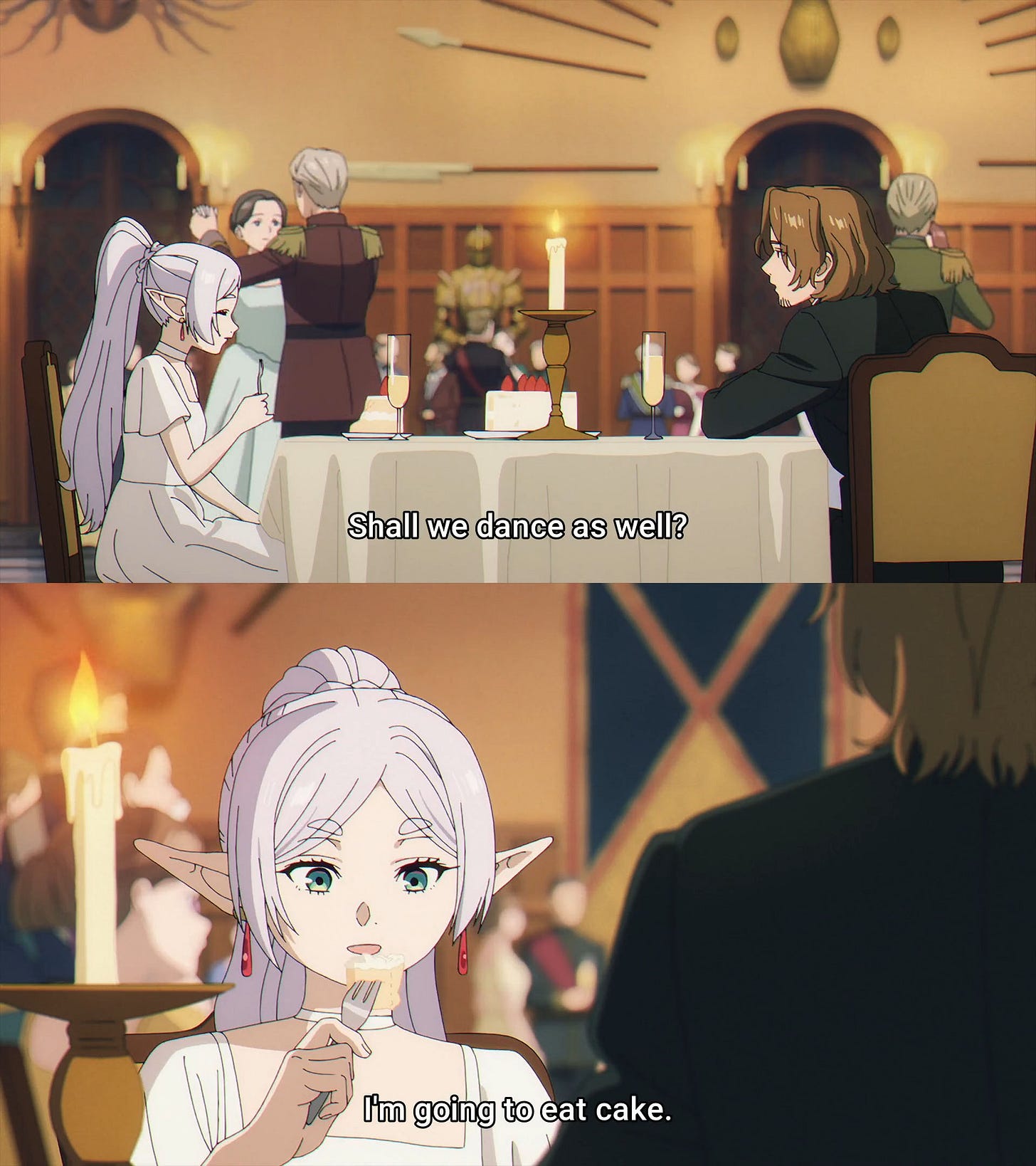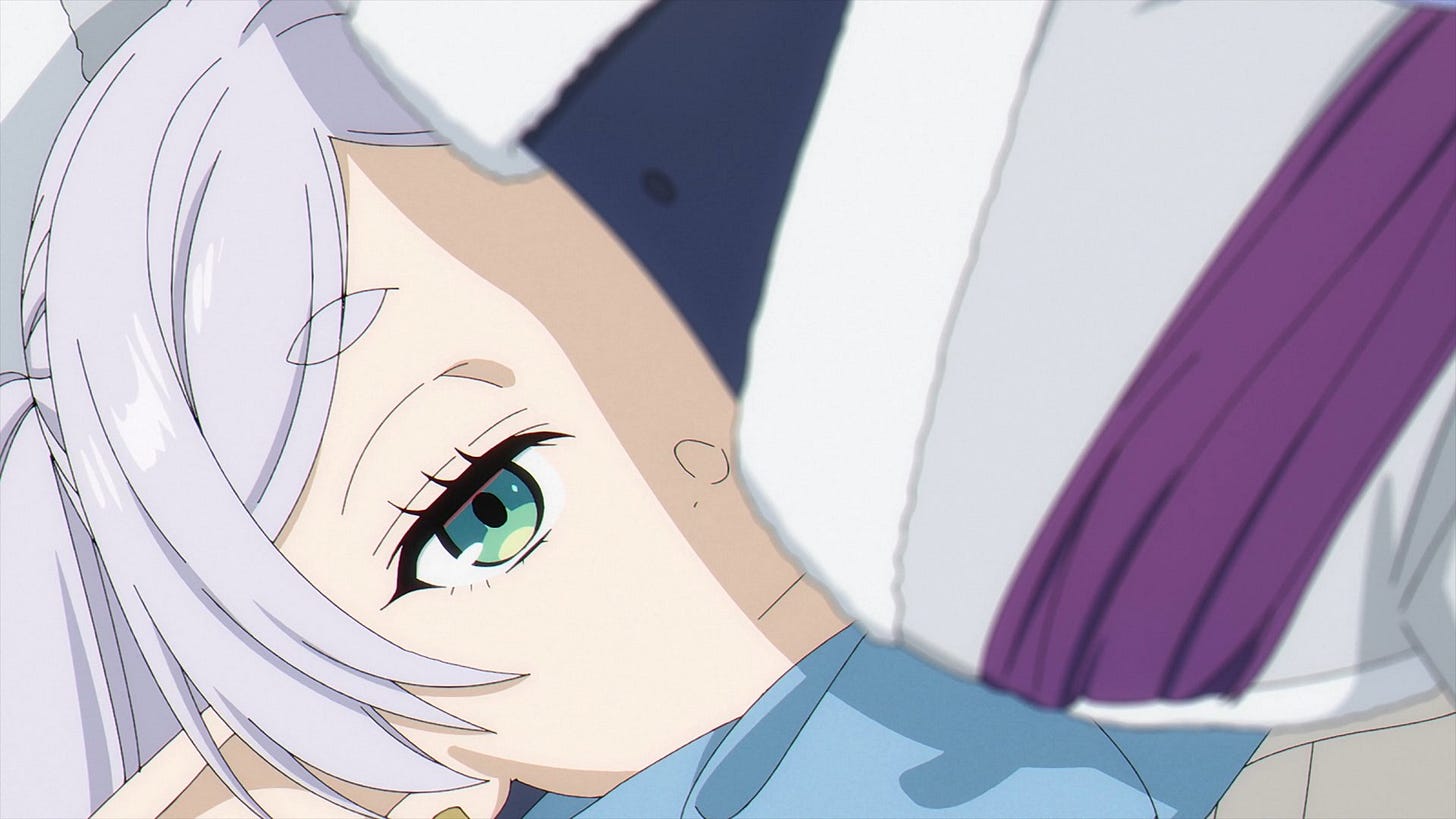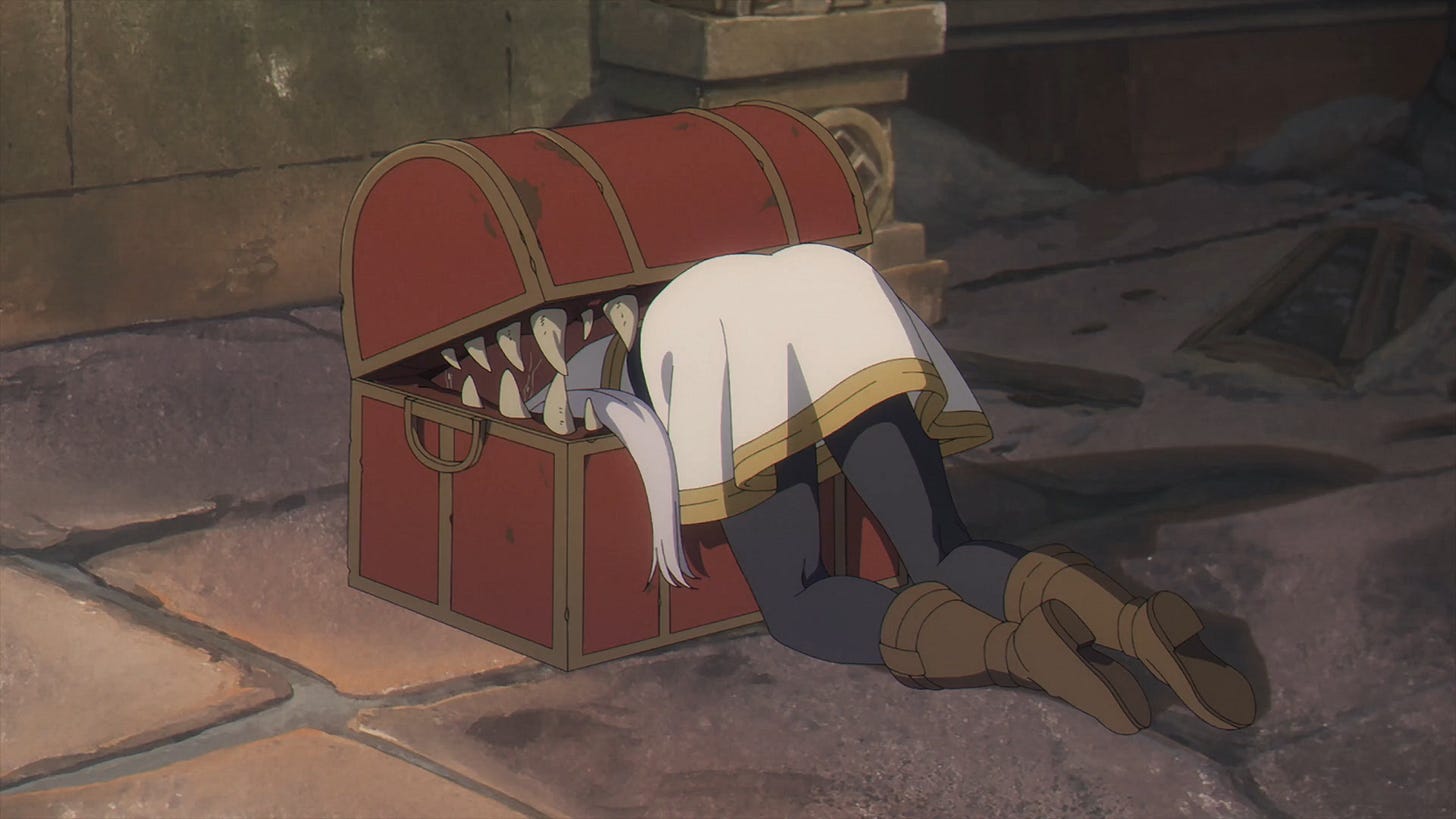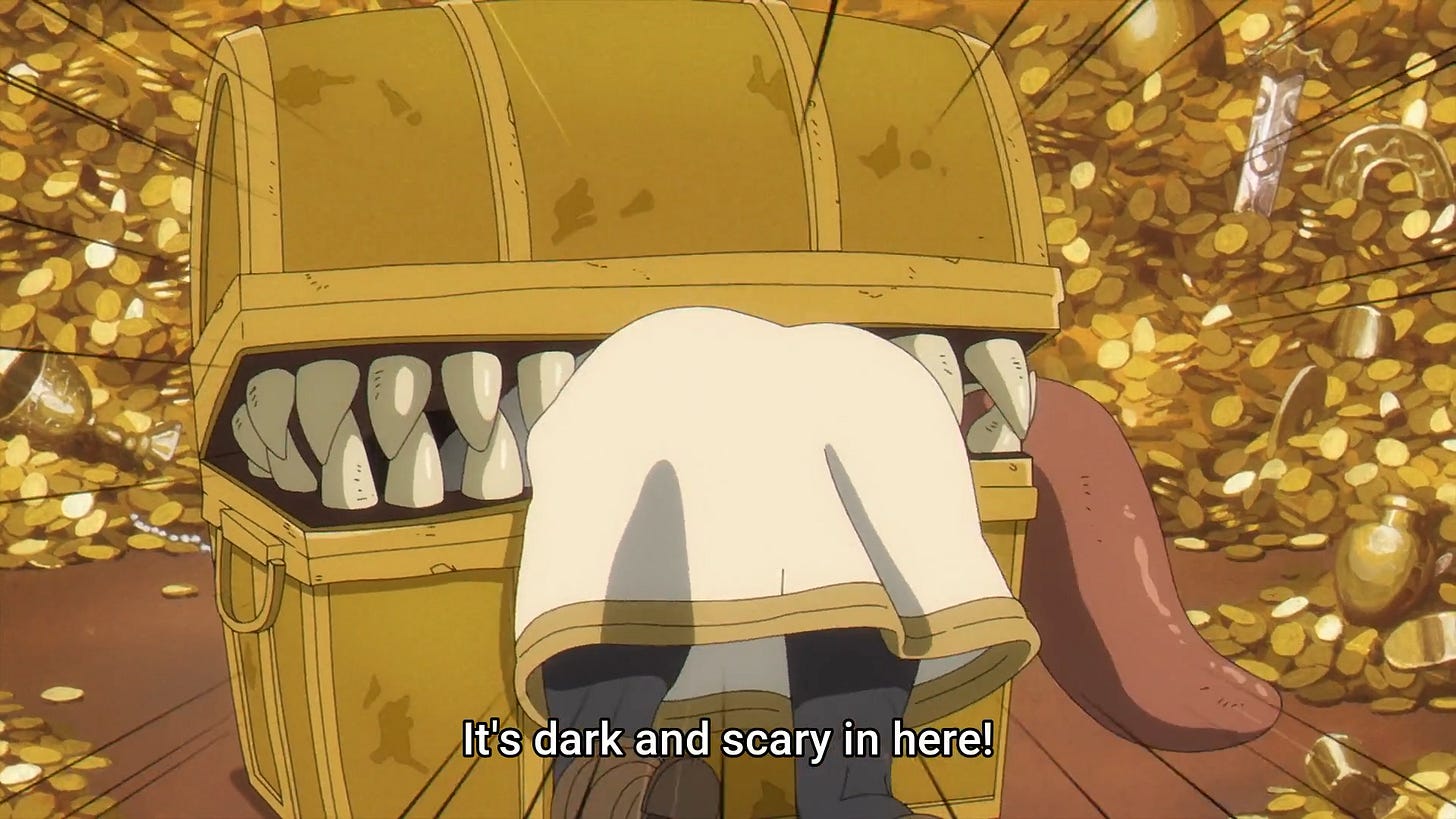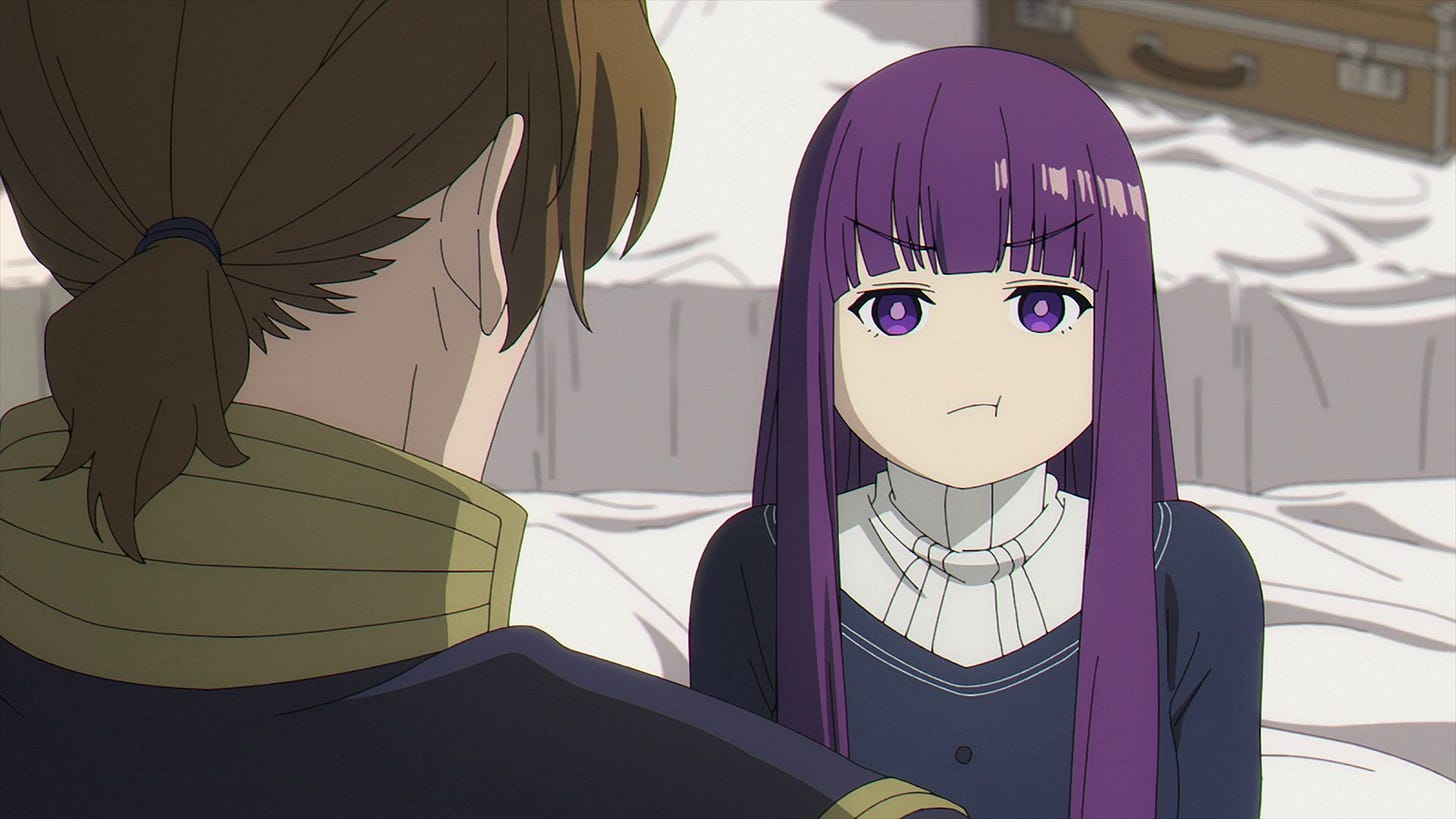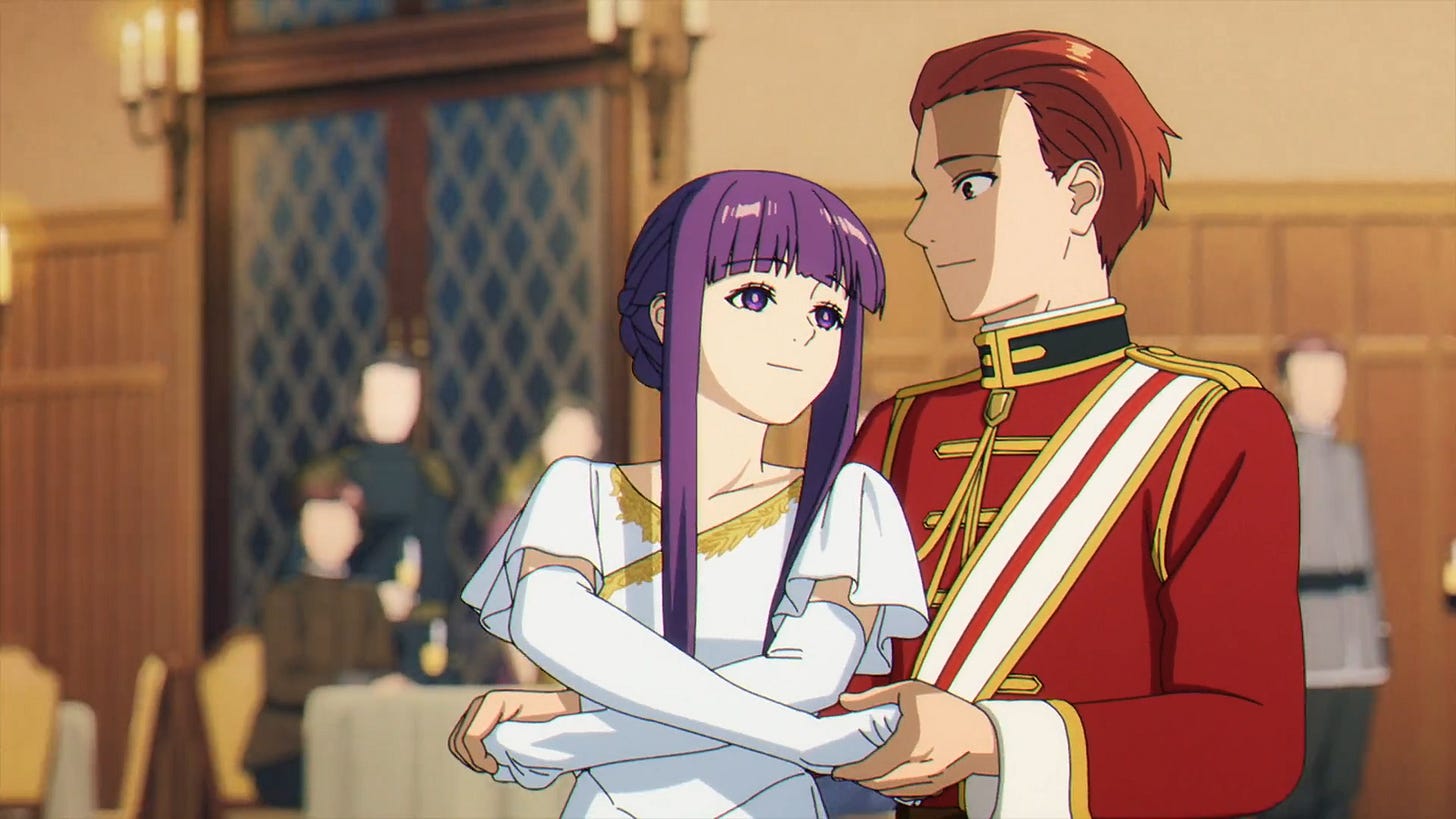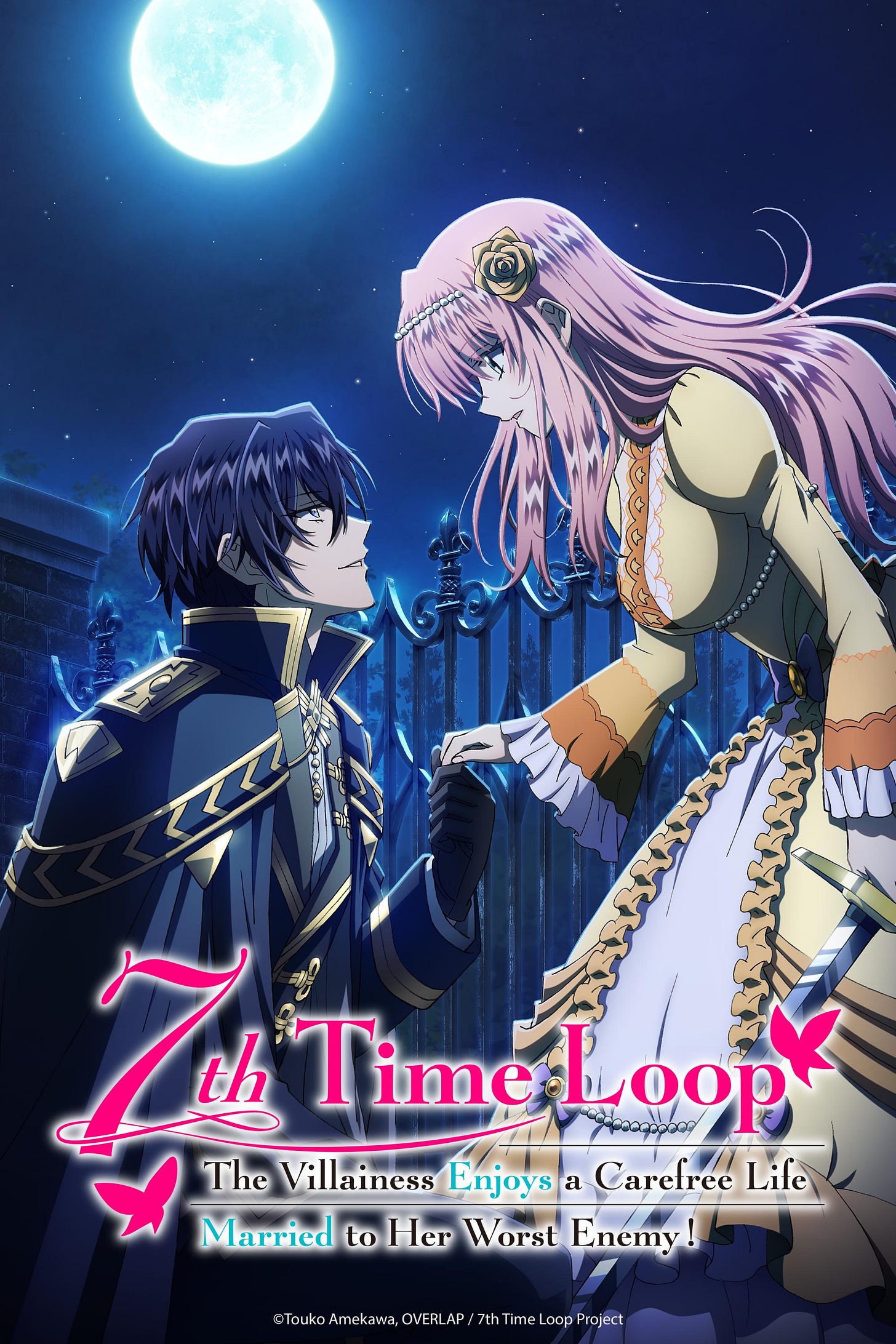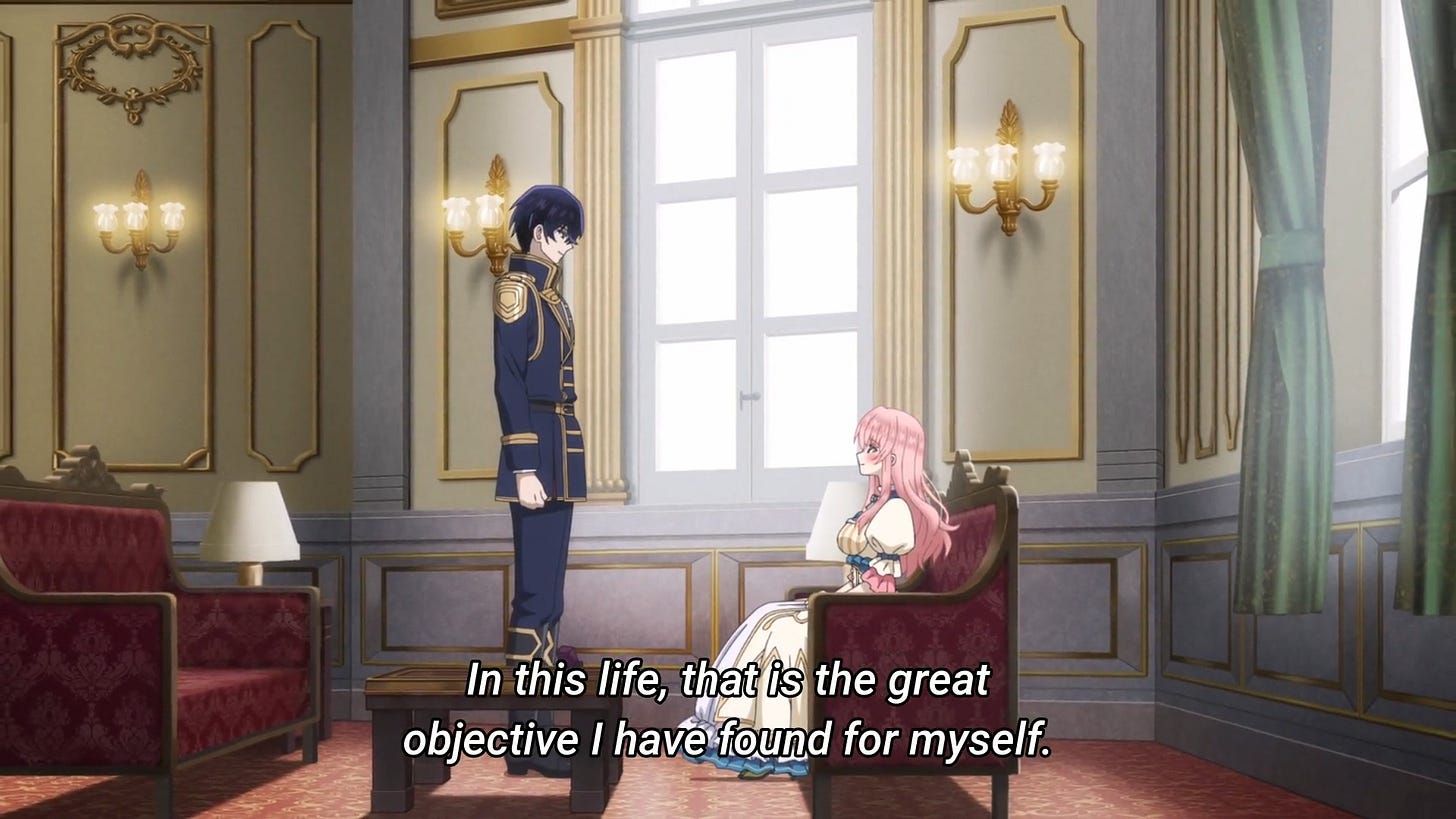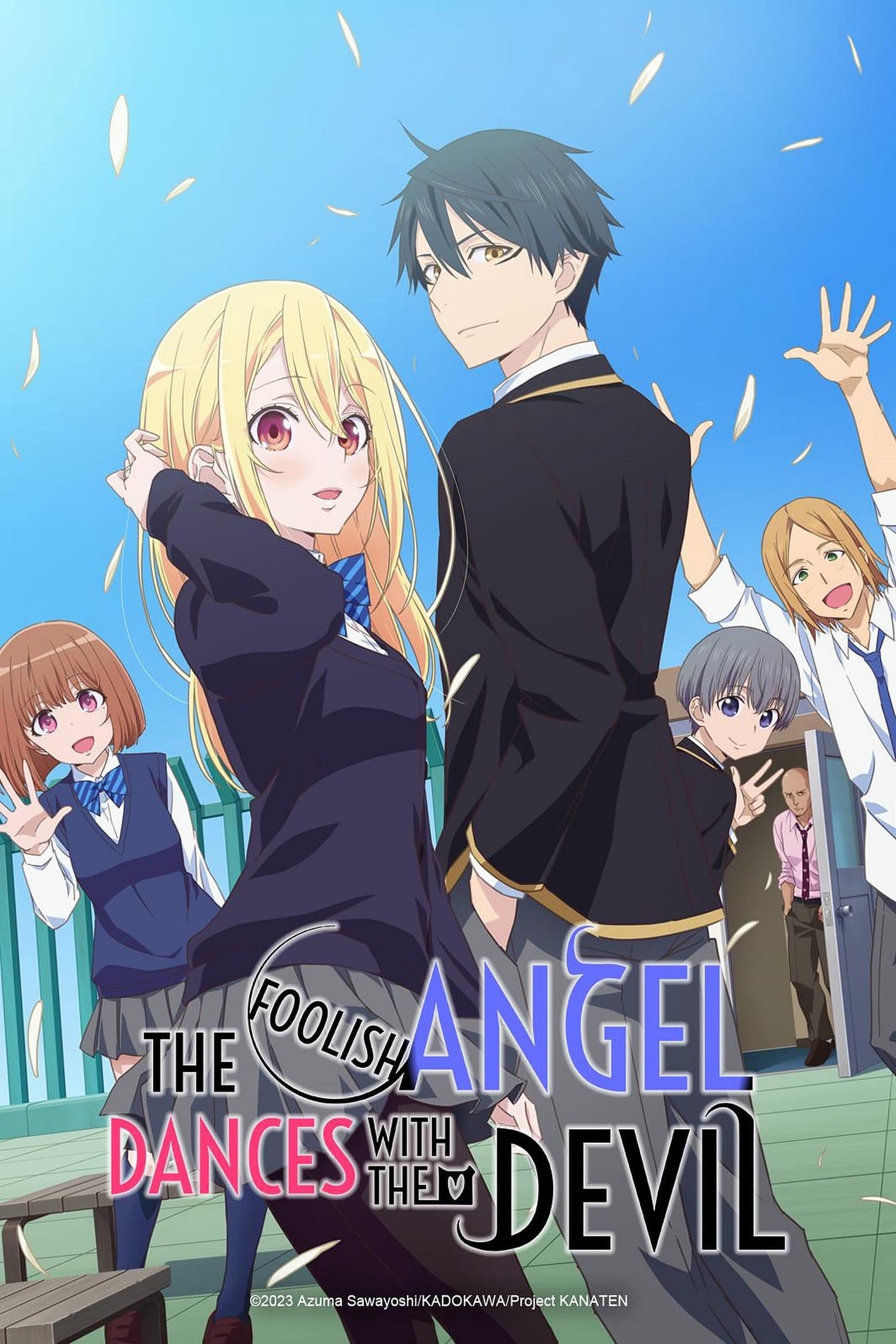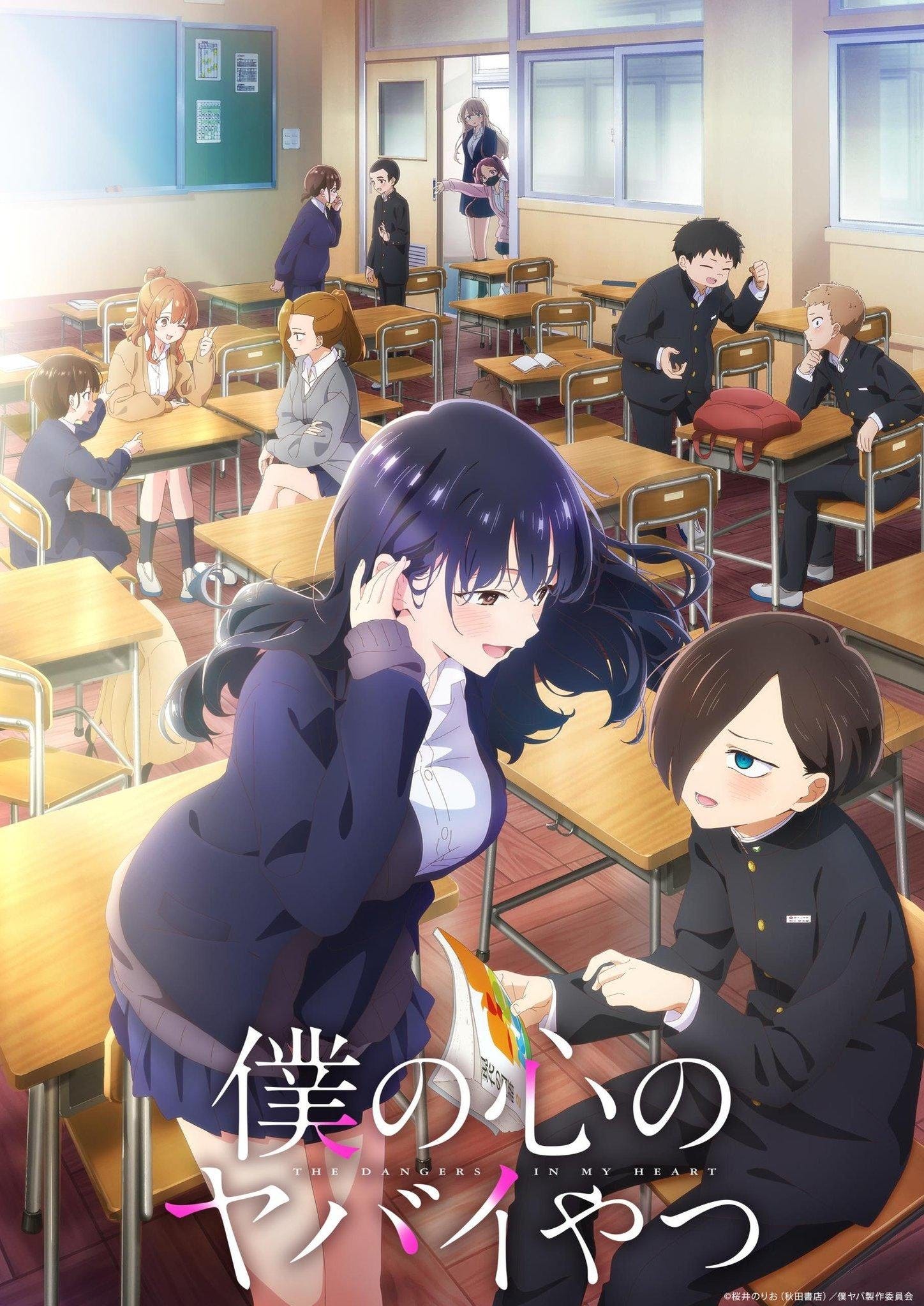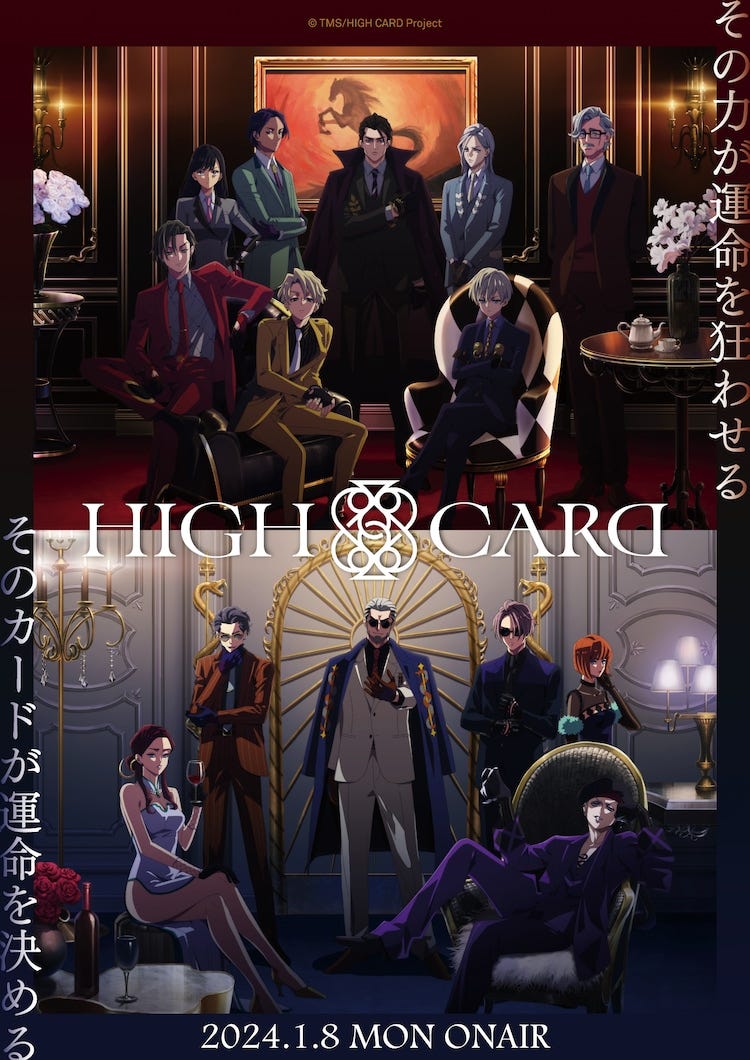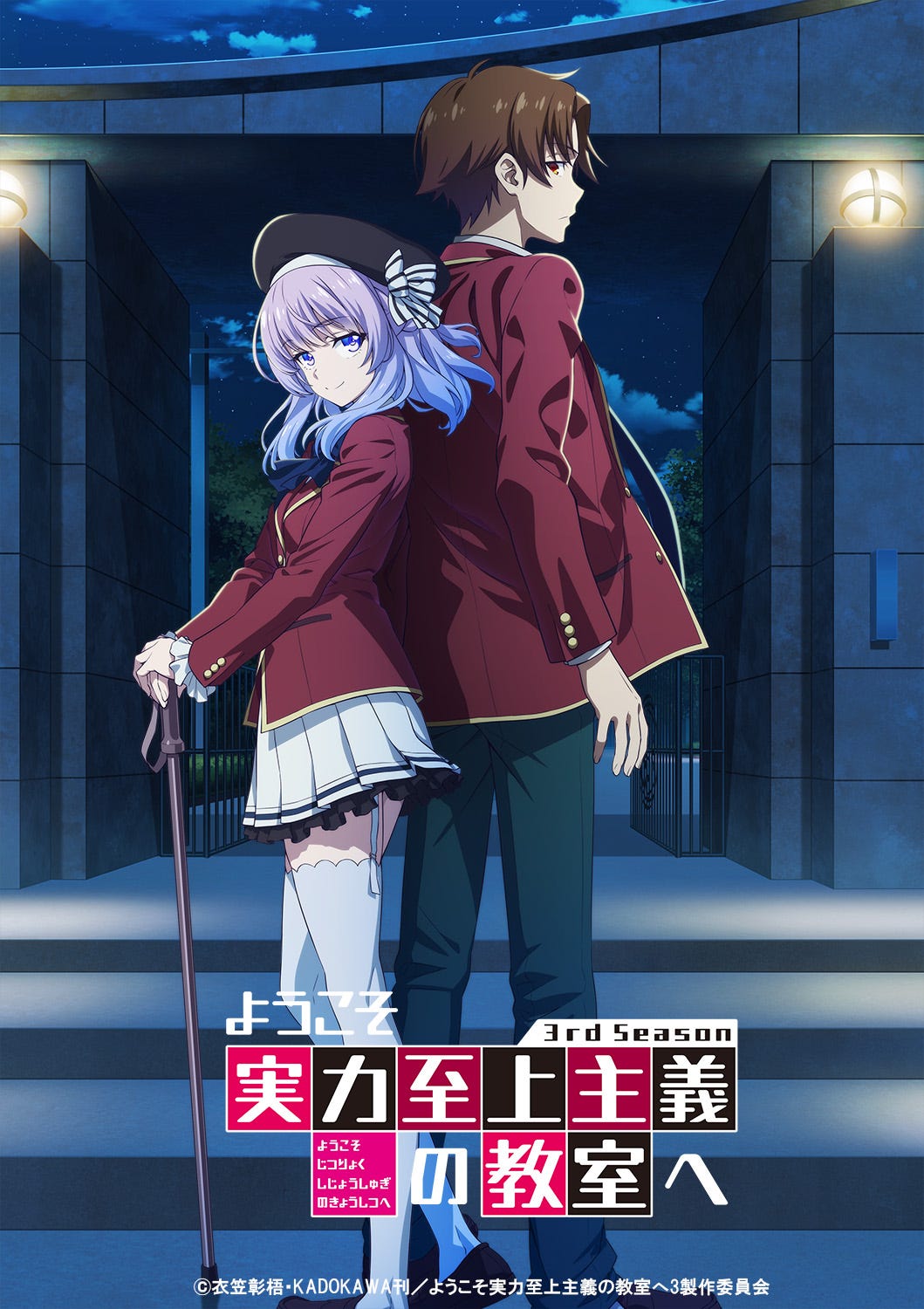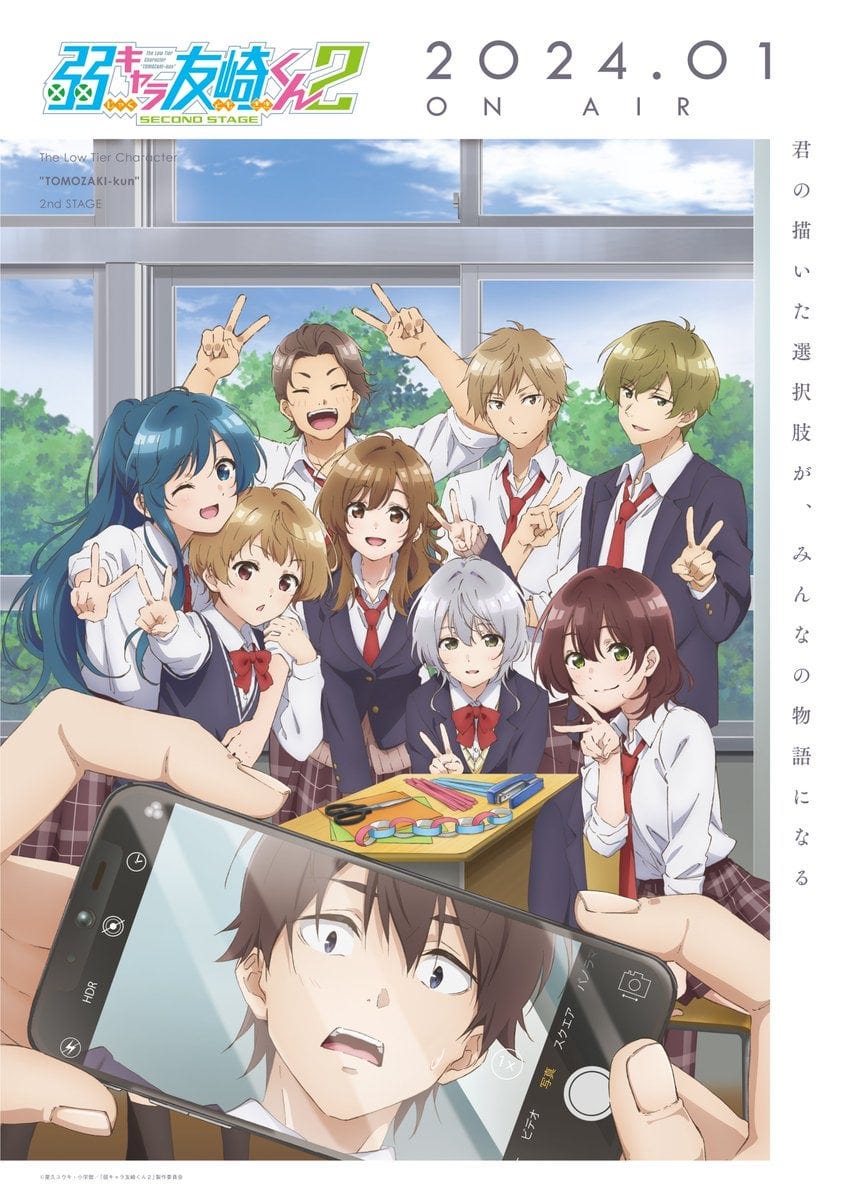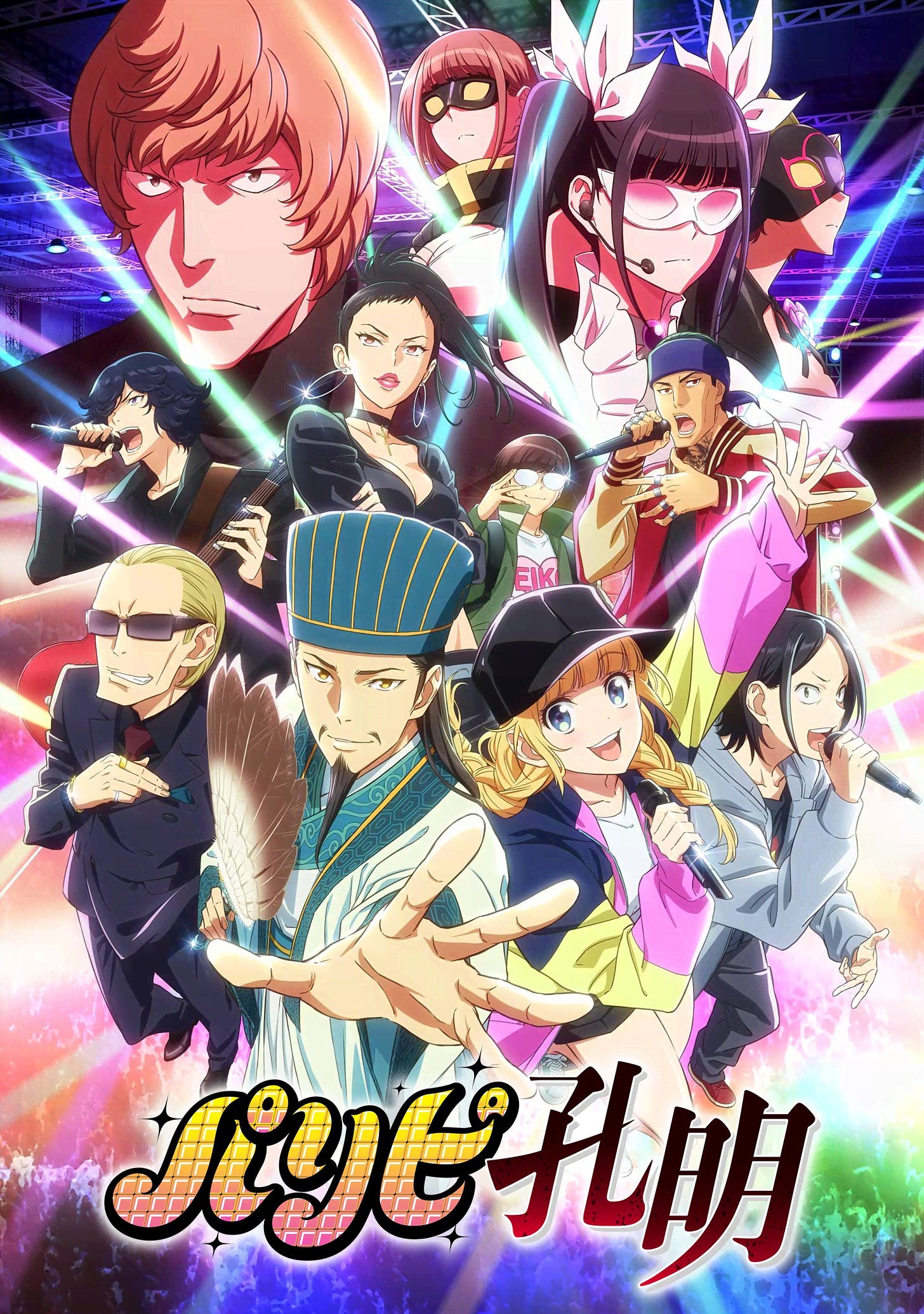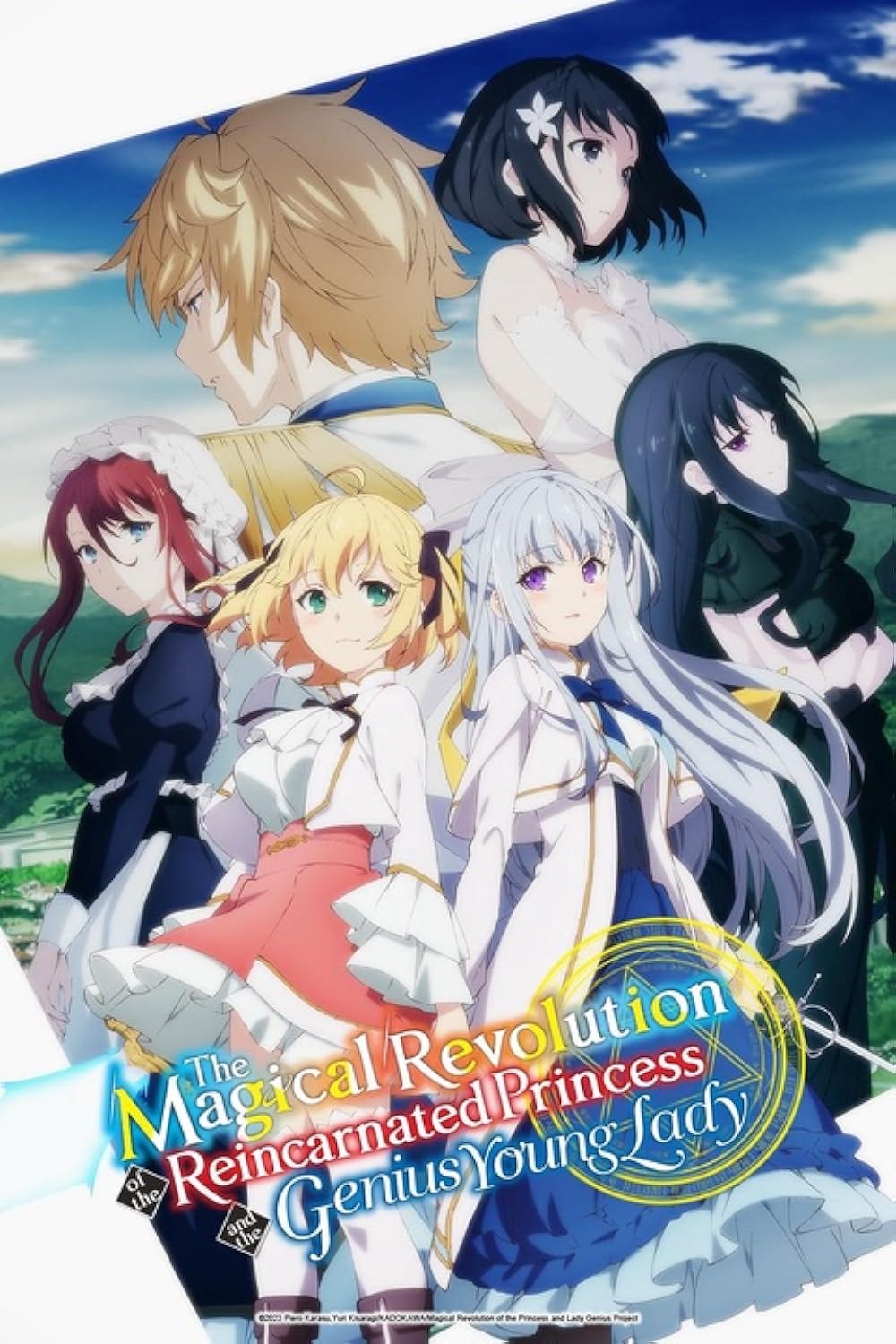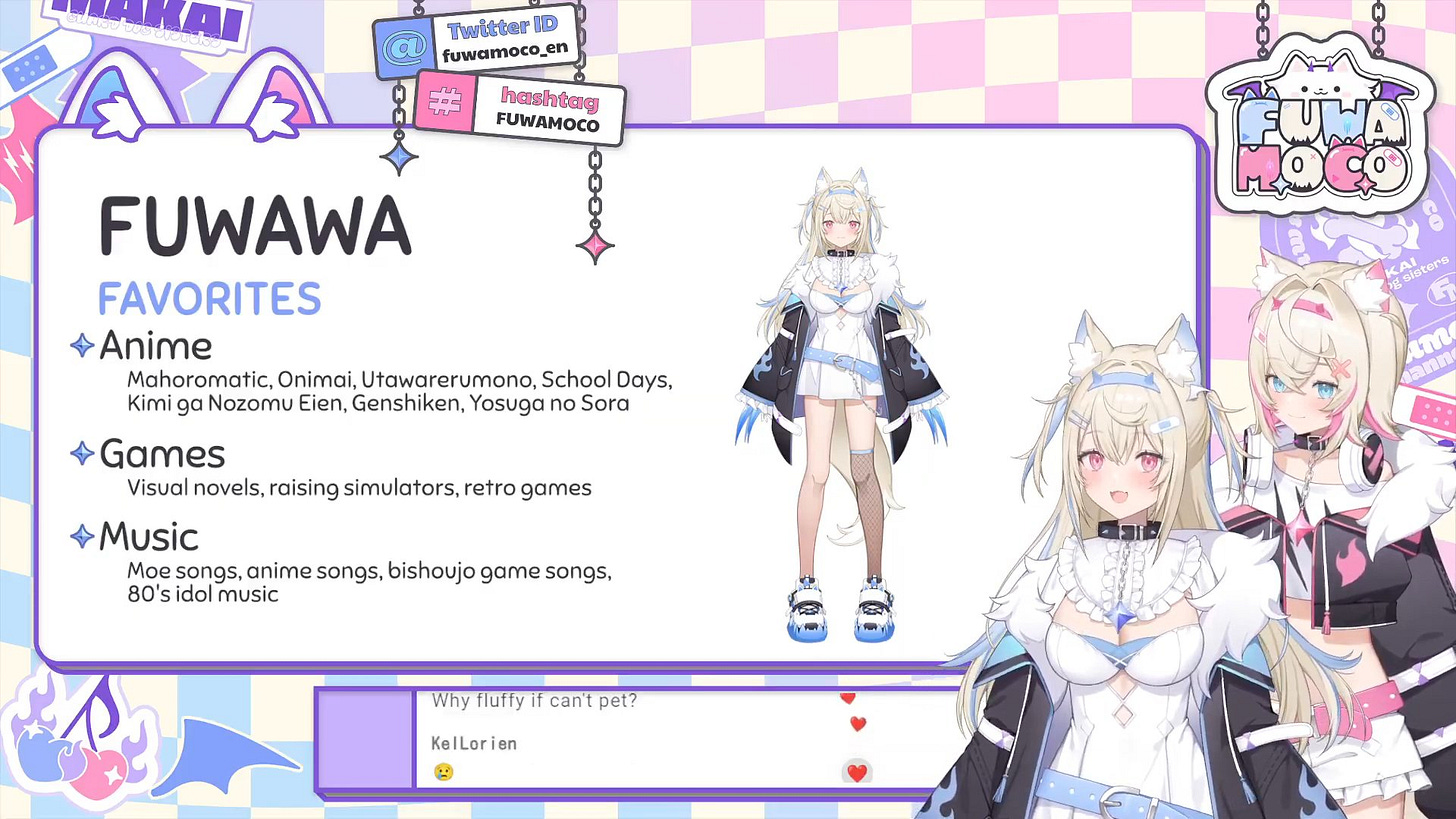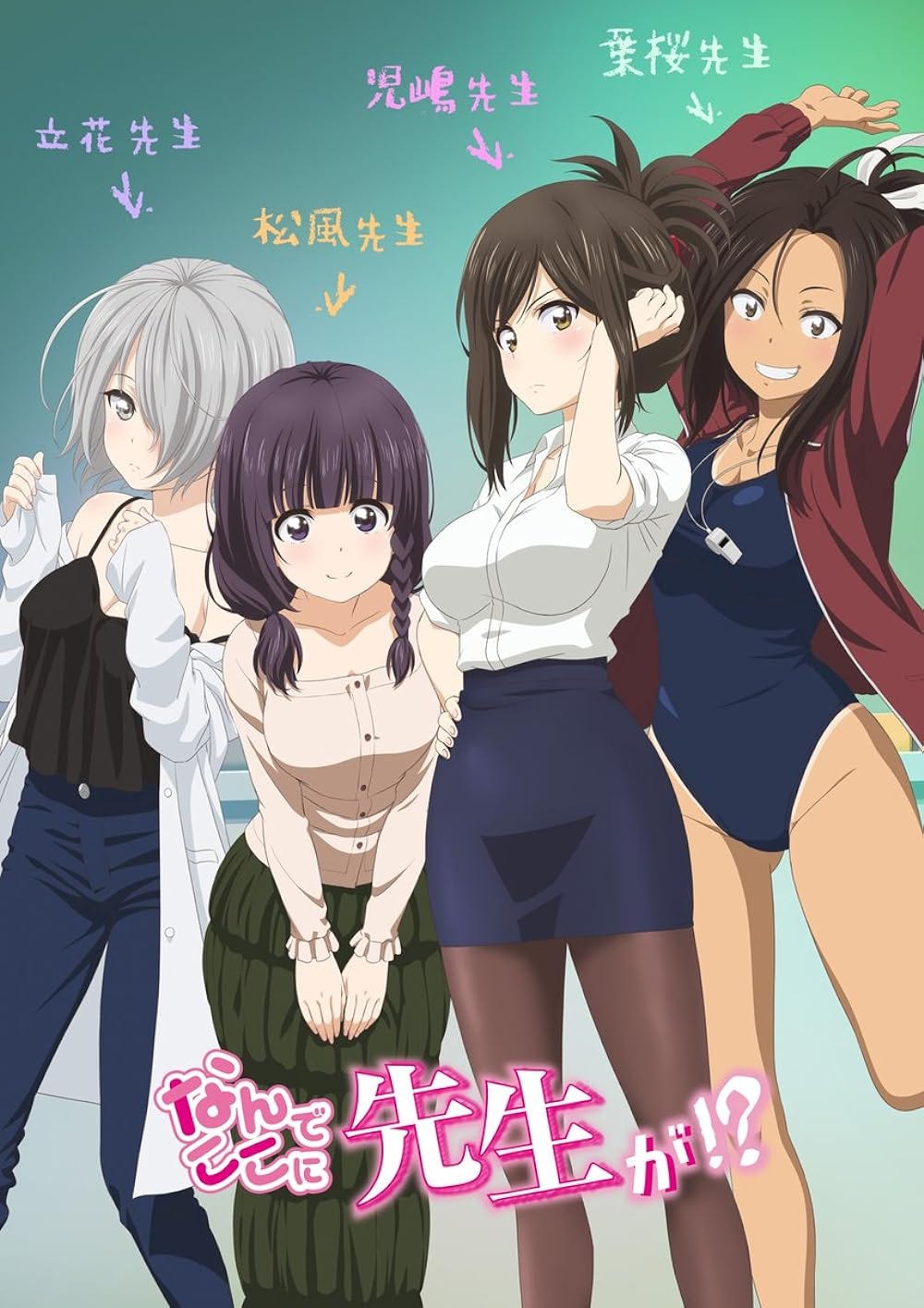Winter 2024 Wrap-Up
This season produced not one, not two, but three shows worthy of perfect tens.
TL;DR If you’re only interested in my ratings:
Originals
A Sign of Affection - 10/10
Mahoako: Gushing over Magical Girls - 10/10
Frieren: Beyond Journey's End - 9/10
7th Time Loop - 8/10
Dog Signal - 8/10
Hokkaido Gals Are Super Adorable! - 6/10
Kanaten: The Foolish Angel Dances with the Devil - 5/10
Sequels
Bokuyaba: The Dangers in My Heart (Season 2) - 10/10
High Card (Season 2) - 7/10
Classroom of the Elite (Season 3) - 6/10
Bottom-Tier Character Tomozaki (Season 2) - 5/10
The Backlog
Ya Boy Kongming! - 9/10
Laid-Back Camp: the Movie - 8/10
Magirevo - 8/10
Aobuta: Rascal Does Not Dream of a Sister Venturing Out - 7/10
Aobuta: Rascal Does Not Dream of a Knapsack Kid - 7/10
Yosuga no Sora - 6/10
Nankoko: Why the Hell are You Here, Teacher? - 5/10
Originals
A Sign of Affection (Ajia-do)
A Sign of Affection is a heartwarming anime that follows the life of Yuki Itose, a university student with congenital hearing loss. Despite her disability, Yuki navigates her world with grace, using sign language, text, and lip reading to communicate. Her life takes a turn when she meets Itsuomi Nagi on a train. Itsuomi, a multilingual young man who loves to travel, doesn’t know sign language, which initially presents a barrier between them. However, Yuki is drawn to Itsuomi's kindness, and the two develop a deep connection despite their communication challenges.
Plot: 9/10 - For many years, the 2016 anime film A Silent Voice has been hailed as the gold standard for deaf representation in anime. It's a tough act to follow, but A Sign of Affection steps up to the challenge and delivers something truly remarkable. What sets this anime apart is its departure from the typical shoujo tropes. Instead of relying on clichés, it takes a fresh approach, highlighting the importance of communication, mainly through sign language. The romance between Yuki and Itsuomi is at the story’s core, beautifully intertwined with Yuki's deafness. Itsuomi's sincere efforts to understand and support Yuki drive their relationship forward despite their hurdles.
But this show isn't just about the romance; it explores the themes of friendship, acceptance, and personal growth. The dynamics between Yuki, Itsuomi, and their friends, including the complexities of a love triangle, add richness to the narrative. It's a delicate balance of sweet romance and the challenges of navigating relationships when communication barriers exist.
The pacing is excellent from episodes 1-6; you could end the show after episode 6, and I wouldn’t complain. Episode 7 and beyond is where things get tricky because it’s clear that the show will eventually have to address Yuki and Itsuomi’s unrequited love interests (Oushi and Emma, respectively). It doesn’t quite stick the landing as neatly as I would’ve liked, but the overall journey was smooth and enjoyable to watch.
Characters
Protagonists: 10/10
Yuki
Yuki is depicted as a deeply caring and empathetic protagonist. She treats others with kindness and is open to making new connections despite the communication barriers she faces due to her deafness. Her willingness to understand and connect with people around her, including Itsuomi, showcases just how compassionate she is.
Despite her hearing impairment, Yuki demonstrates a strong sense of independence. She navigates a world designed for the hearing with courage and determination, attending a public university and exploring new experiences outside her previously sheltered life. This independence is a testament to her resilience and willingness to step out of her comfort zone.
Yuki's adaptability in communication is another critical aspect of her character. She uses sign language, lip-reading, texting, and even creates a sign language teaching guide for Itsuomi, highlighting her creative approach to overcoming communication barriers. Her efforts to bridge the gap between her world and those of others underscore her proactive and innovative nature.
Itsuomi
Itsuomi demonstrates deep respect and support for Yuki, acknowledging her as a "pure soul" and appreciating her for who she is rather than seeing her through the lens of her disability. This respect is foundational to their relationship, showcasing Itsuomi as someone who values Yuki's individuality and autonomy.
His willingness to learn JSL to communicate with Yuki is also integral to his character. This effort goes beyond romantic interest; it shows a genuine desire to bridge the communication gap and connect with Yuki on her terms, highlighting his commitment and care.
In addition, Itsuomi's ability to speak multiple languages and his interest in traveling add depth to his character, making him more intriguing and worldly. This aspect of his personality contributes to his appeal and complements the theme of communication central to the series.
While Itsuomi is protective of Yuki, he also encourages her to explore the world and experiences beyond her comfort zone. This balance between protection and encouragement is crucial, as it supports Yuki's growth and independence without overshadowing her agency.
Supporting Cast: 9/10 - I would’ve rated this category a perfect ten if the supporting characters' storylines had been more neatly tied up by the end. Emma's decision to date Shun and Kyouya's choice to date Rin felt rushed, leaving me wishing there had been more time to work out their emotions and motivations. As for Oushi, it seemed like Yuki never truly understood him or his world, even after he attempted to be kinder to her following his “fight” with Itsuomi. I hoped he’d get some form of closure, but I suppose life doesn't always work out how you want it to. Other than that, the supporting cast naturally integrates themselves into the plot without detracting from Yuki and Itsuomi’s love story.
Genre: 10/10 - In the sea of shoujo romance I’ve seen, A Sign of Affection punches above its weight. Yuki and Itsuomi's relationship develops through sign language, written notes, and understanding each other's body language, offering a fresh perspective on how connections can be formed without spoken words. This nuanced portrayal of communication is a key differentiator from other romance anime, where verbal interactions are typically the norm.
But what really sets this series apart is its authenticity; there are no clichés of love at first sight, and Yuki navigates her feelings realistically, seeking guidance from her friends as needed.
Art/Animation/Design: 10/10 - The animation is undeniably impressive, displaying exceptional detail in capturing the intricacies of Yuki's world. Every nuance is captured accurately, from subtle lip movements to precise hand gestures. The anime also uses color contrasts to depict Yuki's emotional states and the richness of her experiences as she grows closer to Itsuomi.
Moreover, the cast's facial expressions, especially Yuki's endearing moments of embarrassment around Itsuomi, are quite fun to watch. She’s simply a bundle of joy, which makes her a character worth rooting for and makes you strongly desire to protect her as Itsuomi does.
Also, it's hard not to admire just how attractive this cast is; they exude a captivating charm that makes the show feel like a glorified Uniqlo ad. I couldn’t help but marvel at how fashionable everyone looked.
Music: 10/10 - The OP (performed by the same singer as the Blue Orchestra OP) is fantastic, and the ED is even better. The sound design plays a crucial role in conveying the silence of Yuki's world, with moments of complete silence or muffled sounds representing her perspective. Her inner monologues and moments of introspection also have a soft, gentle tone as she grapples with these newfound emotions of hers.
Final Score: 9.5 > 10
Would I recommend? Absolutely! If you’re either a romance fan, interested in inclusive representation, want to learn more about sign language and deaf culture, or like character-driven stories in general, A Sign of Affection ticks off all of those boxes.
Mahoako: Gushing Over Magical Girls (Asahi Production)
Hiiragi Utena admires magical girls and dreams of becoming a heroic figure fighting against evil. One evening, a doll-like figure claims she possesses dormant magical powers, sparking Utena's excitement. However, her dream takes an ironic turn when she transforms into a villain. Uninterested in aligning with the forces of evil, Utena attempts to quit. However, a group of magical girls appears, declaring war. As a battle unfolds, Utena discovers a penchant for inflicting pain on others, revealing her true nature.
Mahoako follows Utena as she embraces her new role as the leader of villains, engaging in battles against magical girls and indulging in her newfound sadistic tendencies.
Plot: 10/10 - So I’m not at all familiar with magical girls. In fact, Mahoako is the only magical girl show I’ve watched, and I have a feeling it’s not at all representative of the genre. Despite this, I was still thoroughly entertained. At its core lies a fascinating premise: the transformation of a magical girl enthusiast into a formidable villain, offering a refreshing twist on the conventional magical girl narrative. Witnessing Utena, Kiwi, and Korisu engage in both heartwarming moments and fierce battles from the perspective of the antagonists was a lot of fun.
One of the highlights of the series was the escalating conflict between the Enormita faction and Utena's group in the latter half of the show. This additional tension layer complements the rivalry between the Tres Magia and Utena's allies, intensifying the stakes and driving the narrative forward. Venalita emerges as a particularly intriguing character, shrouded in mystery with hidden motives that promise to unfold intriguing plot developments.
Despite its adherence to traditional magical girl tropes, Mahoako offers a fresh perspective without entirely subverting expectations. The execution of familiar tropes from a different angle ensures that the series remains engaging and enjoyable, even for viewers familiar with the genre. Overall, Mahoako perfectly balances innovation and familiarity, delivering an entertaining and compelling storyline.
Characters
Protagonists: 10/10 - I genuinely found nearly every character in this cast to be likable. The chemistry between our leading villain trio (Utena, Kiwi, and Korisu), as well as the Tres Magia (Magenta, Azul, and Sulfur), was fantastic. I do want to call out Utena and Azul here because their character arcs are very well-written.
Utena: Initially a timid fan of magical girls, Utena eagerly embraces the chance to become one herself, only to discover she must instead play the role of their adversary. Despite her initial reluctance and fear, she gradually unveils her sadistic tendencies, relishing in the torment of Tres Magia. This transformation unfolds across several episodes as she evolves from reluctance to embrace her villainous nature, using methods of humiliation and torture. And yet, she maintains a desire to see her opponents grow and thrive, pushing them to their limits while reveling in their strength as magical girls. This dichotomy adds depth to her character, showcased poignantly in episode 7, where her motivations are laid bare. Her treatment of Azul and impassioned speech underscores her complex relationship with magical girls. As the series progresses, Utena's love for magical girls becomes undeniable, juxtaposed against her aversion to their demise. She sees her actions as catalysts for growth rather than destruction, strictly opposed to killing them. Utena emerges as a compelling protagonist, deftly navigating the realms of dominance and sadism. Beyond her ecchi and lewd aspects, she shines as a well-rounded character, her complexities adding a layer of intrigue to her narrative. Her transformation from shy fan to formidable foe, alongside her newfound camaraderie, marks her as one of the standout characters of this winter season.
Azul: Initially presented as the poised and serious member of the magical girl trio, Azul’s hidden masochistic tendencies gradually come to light, particularly in her interactions with Utena over two episodes. Throughout the first half of the series, she consistently finds herself on the receiving end of punishment during battles, a fact not lost on Magenta and Sulfur. This pattern escalates into a genuine concern as Azul herself acknowledges her worsening performance, culminating in a moment of vulnerability before Utena, marking her lowest point in the anime. Nevertheless, Azul’s journey takes a positive turn after she hits rock bottom. She embarks on a path of growth, integrating her masochism into her training regimen while striving for improvement alongside her more capable peers. Despite her previous setbacks stemming from her indulgence in her kinks, Azul becomes a stronger magical girl, building up to her eventual triumph over Utena in a rematch and legitimizing her character arc. Notably, contrasting with Utena, Azul's struggles arise from the negative impact of her kinks on her role as a magical girl. Unlike Utena, whose embrace of her kinks coincides with her villainous role, Azul's initial inability to manage her desires results in a decline in her powers. However, her journey towards overcoming this slump and balancing her personal inclinations and duties as a magical girl is worthy of praise. While Utena remains my favorite character in the series, Azul stands as a close second, showcasing her resilience and growth throughout the show.
Supporting Cast: 9/10 - Not much needs to be said about Loco Musica and Leberblume. This duo is a match made in heaven complete with a backstory that gives credibility to their say gex in the white room Utena traps them in. They seamlessly integrate themselves with our main villainous trio as they plot a rebellion against Lord Enorme and Sister Gigant. Speaking of which, they’re why this category isn’t a perfect 10 for me. While I was satisfied by their roles in the overall plot (acting as a secondary antagonist faction to Utena and co.) I wanted to learn more about their journeys to becoming the leaders of Enromita. How did they stumble into these positions? How did Venalita recruit them? And speaking of Venalita, what exactly are they plotting along with Sister Gigant, who was spared in her fight against Kiwi? I’m not asking for direct answers to these questions, but perhaps teasers for a second season, which I really hope happens.
Genre: 10/10 - Again, I’m not an expert in magical girls, but of the other genres Mahoako is a part of (action, comedy, fantasy, yuri, and ecchi), it excels in every one of them, specifically the ecchi. At the time of airing, the show aired uncensored, with frequent instances of full nudity, including uncensored nipples in nearly every episode. This departure from the norm in ecchi anime is a refreshing change, providing a raw and unfiltered portrayal of the characters' experiences. What sets Mahoako apart is how seamlessly the ecchi is integrated into the story. Given the show's exploration of various kinks and the characters' journey of self-discovery within a magical girl and villain context, ecchi becomes an integral part of the show. Whether it's Utena delving deeper into her sadistic fantasies, Azul embracing her masochistic tendencies, or Loco's ability to sing only when exposed, the ecchi serves a purpose beyond mere titillation. Even more daringly, the series features explicit yuri moments between characters. Yet, these scenes remain central to the plot, underscoring the show's commitment to weaving ecchi seamlessly into its narrative fabric.
Art/Animation/Design: 10/10 - I’ve only watched one other show from Asahi Production (A Galaxy Next Door), and I thought the animation was decent. I’m not sure what changed since then, but you could tell the animators put a lot of passion and soul into this project. The character designs were my favorite aspect of Mahoako’s AAD. Not only was the explicit content well done, but the fights were surprisingly good, too. I can’t point out a specific moment when I thought something looked off either.
Music: 10/10 - The OP and ED were really catchy, plus the classical music used whenever the Tres Magia were in a bind (sometimes literally) or whenever Utena was toying with her opponents was pure perfection.
Final Score: 9.9 > 10
Would I recommend? Yes, but only if you’re familiar with the ecchi genre or don’t mind ecchi in anime because this show has a ton of it. If you toss your morals aside for 13 episodes, you’ll definitely enjoy this one. Otherwise, I could see people dropping this one after one episode not realizing what they’re getting themselves into.
Frieren: Beyond Journey's End (Madhouse)
Over the span of a decade, Himmel and his crew—Heiter, the priest; Eisen, the dwarf warrior; and Frieren, the elven mage—band together to take down the Demon King. Bonds form amid their adventures and battles, creating cherished memories for most. For Frieren, however, these moments are but a blip in her thousand-year existence. After the party disbands post-victory, Frieren resumes her routine of spell collecting across the land, seemingly unfazed by the passing years.
But as time passes, Frieren realizes the impact of her time with the party, especially after losing two companions. She regrets not cherishing those moments more and vows to understand humans better, seeking genuine connections. Though their grand journey may be over, Frieren's journey of self-discovery is just beginning, promising new adventures and lessons along the way.
Plot: 9/10 - When “Frieren” began last fall, it started by airing the first four of 28 episodes total. After watching those first four episodes, I said the following in a Discord message: “it's a 7 for me rn. I don't frequently watch this genre, but when I do, it’s usually accompanied by comedy, whereas this leans into the drama and adventure more. It looks great (shoutout Madhouse), but I'm not yet emotionally invested. Time will tell.”
I’m giving the plot a 9 because while the show does get funnier over time (and spawned a ton of memes online), I didn’t feel quite as emotionally invested in Himmel and Frieren’s relationship as many others have. This isn’t the show’s fault, and I actually think it did all the right things to characterize Himmel after his death. However, I didn’t really feel anything until it was revealed that Himmel had known Frieren since he was a young boy. She was his first and last love, and I thought that was beautifully depicted.
Speaking more generally about the narrative, at its core, “Frieren” is a meditation on the fleeting nature of existence and the significance of the present moment. Through its characters, it explores the importance of seizing opportunities and cherishing the small moments that define our lives. As the story unfolds, it becomes clear that wisdom often comes from unexpected sources, and the seeds of insight planted by a single encounter can grow into profound understanding over time.
Characters
Protagonists: 9/10 - The main three are all so likable that it’s difficult to find any flaws.
Frieren has a unique perception of time due to her centuries-long lifespan. Initially reserved, her experiences with mortality, particularly the death of Himmel, prompt her to seek a deeper understanding of human emotion. Despite her immense power, Frieren remains relatable through her vulnerabilities and expressions of empathy, challenging the stereotype of the aloof kuudere. Her quirks, such as a spell to create sour grapes or an obsession with collecting grimoires, are revealed to be deeply connected to cherished memories, creating this sort of gap moe within her character.
Fern, a war orphan turned apprentice mage, gives the group a grounded presence and sense of urgency. Mature and skilled, she acts as a maternal figure to Frieren while retaining a calm demeanor, though she isn’t without her moments of vulnerability. She also has some of the best pouts I’ve ever seen in anime.
Stark, a warrior scarred by past trauma, grows significantly throughout the series. Initially lacking confidence, he proves himself capable during pivotal moments, overcoming his doubts and insecurities.
Supporting Cast: 9/10 - There are so many great supporting characters who I came to like for one reason or another:
Flamme - A legendary human wizard and Frieren’s mentor. She adds historical depth to the series, as her teachings and relationship with Frieren provide insight into Frieren's motivations and the broader magical world of the series. Flamme's influence is seen in Frieren's development and approach to magic and combat.
Sein - If he stayed just a little longer with Frieren, he could’ve adventured with the cutie onee-san (Methode) he always wanted.
Lawine and Kanne - Their interactions with Frieren and the main party, particularly their gratitude towards Frieren for her help, showcase the series' focus on camaraderie and the influence characters have on each other's lives. These moments of connection and farewell highlight the transient nature of relationships in the series, especially against the backdrop of Frieren's long lifespan. I want to thank them for their constant infighting, which spawned countless =w= Frieren face memes.
Ubel and Land - I don’t think I can fix Ubel, but Land probably could. Ubel might not have done much in the grand scheme of things, but she’ll definitely be remembered for how skilled she was in combat. Also, can we talk about how Land passed the first-class mage exam WHILE SIPPING TEA AT HOME?! The man took the meaning of working from home to another level.
Denken - My only thought whenever he appeared on screen was, “He’s so real for that.”
Sense - I found it very impressive how she managed to keep a straight face and demeanor while she followed Frieren and Fern through the dungeon. I also found it amusing how she declared herself a pacifist and proceeded to oversee a trial that was basically a death trap.
Serie - An influential elven wizard and Flamme's instructor, known as a living grimoire. Her establishment of the Continental Magic Association and her role in governing and teaching magic across the realm adds a layer of political and educational structure to the series. Serie's character is intriguing for her complex relationship with Flamme and Frieren, as well as her militaristic views on magic, which contrast with the series' often introspective and peaceful tone. I also came to the conclusion that she technically fits the definition of a tsundere, which I thought was pretty funny.
Genre: 10/10 - “Frieren” offers a fresh perspective on the fantasy and adventure genres, focusing more on the aftermath of the heroes' journey and the personal growth of its characters rather than just the action. This subversion of traditional storytelling highlights Frieren’s philosophy and the consequences of her actions, offering a contemplative exploration of time, mortality, and existence.
Art/Animation/Design: 10/10 - “Frieren” is a masterclass in subtlety, capturing the nuances of emotion and expression with meticulous detail. The chosen art style perfectly sets the tone for the story, evoking a medieval aesthetic that enhances the overall atmosphere. The landscape shots are exceptionally breathtaking, which make for excellent desktop wallpaper material. Each scene feels vibrant yet retains a serene quality, contributing to the immersive nature of the world. What truly stands out is the attention to detail, with backgrounds changing dynamically to reflect different seasons, further enriching the viewing experience. Even the slightest movements, such as grass swaying or the flowing of clothing and hair, are animated with such realism that they breathe life into the scenes, captivating the audience throughout.
Episode 15 was when I was convinced that this show could do no wrong when it came to animation. The dance between Stark and Fern without the use of CG was so beautiful. I had to replay it to truly appreciate what I was watching.
Music: 10/10 - I must commend Evan Call for his exceptional work on the score. It seamlessly blends Celtic tunes for moments of serenity, orchestral crescendos for emotional peaks, and crashing operatic sounds for intense fight scenes.
The series also features three songs in its soundtrack. The first OP is Yuusha by Yoasobi, followed by the second OP, Haru by Yorushika, and the series is rounded off with the ED Anytime Anywhere by Milet. Each track is enjoyable in its own right, but Anytime Anywhere stands out the most for its catchy tune and lyrics that resonate deeply with the show’s themes.
Final Score: 9.3 > 9
Would I recommend? 100% yes. Perhaps even for people who are new to watching anime, too. There’s a lot to like about “Frieren” from its emphasis on emotional and reflective storytelling, unique take on the fantasy and adventure genres, strong female representation (without resorting to objectification), incredible animation, minimal use of fanservice, and exploration of the human condition. Even for fans of high-paced action commonly found in battle shounen, I think they can still come to appreciate what “Frieren” has to offer.
Now, enjoy these screenshots I took that didn’t fit anywhere else in this review.
7th Time Loop: The Villainess Enjoys a Carefree Life Married to Her Worst Enemy! (Studio Kai, HORNETS)
Caught in an unbreakable time loop, Rishe Weitzner faces the recurrent tragedy of her engagement to the crown prince being annulled, each iteration ending in her demise at the age of 20. In this seventh loop, Prince Arnold of the neighboring Galkhein Kingdom, notorious for sparking global turmoil and Rishe's demise in past loops, takes an interest in her.
Rishe aims to lead a leisurely life by accepting Arnold's proposal on the condition of avoiding royal duties. Yet, as she employs her acquired skills to help the Galkhein Kingdom's people, she discovers a changed side of Arnold, challenging her perception of him as a cold figure from her sixth loop. Determined to uncover the reasons behind his transformation, Rishe embarks on a journey that defies the patterns of her past loops and promises to unravel the mysteries of her perpetual existence.
Plot: 8/10 - 7th Time Loop wasn’t on my shortlist of shows I wanted to watch for winter 2024. In fact, I didn’t pick it up until after episode 5 aired. While scrolling through Twitter/X, I stumbled upon tweets from the light novel’s author. In response to a tweet from Anime Corner publishing a graphic with 7th Time Loop at the top of its most-watched non-sequel anime for the week, author Touko Amekawa expressed her love and gratitude for her international fans in English. Even if her tweet was machine translated (and it probably was since she’s also tweeted in other languages), the fact that she went through the extra effort to communicate with her fans worldwide speaks volumes about how appreciative she is. I respected that a lot, so I went to MAL, saw that it had the romance tag and involved time travel, and was immediately hooked. After the first three episodes, I absolutely fell in love with Rishe. Unlike many stories in the villainess genre where the protagonist is isekai’d into a game or novel they’re familiar with, Rishe is a native to her world and caught in a time loop within her own life. By avoiding the isekai trope, the series can explore the time loop mechanism in depth, focusing on Rishe's attempts to use her accumulated knowledge from previous loops to change her fate. She’s been a merchant, herbalist, scholar, maid, hunter, and knight, acquiring many skills she utilizes in her seventh loop to navigate complex social and political affairs. This emphasis on personal growth and applying learned skills from past lives adds depth to her character and the story. 7th Time Loop also explores themes of political intrigue and the looming threat of war, which Rishe aims to prevent in her seventh loop. Her marriage to Arnold is a strategic move to avert the conflicts that have led to her demise in past loops. This focus on political maneuvering and the complexities of war distinguishes 7th Time Loop from other villainess stories that may focus more on romance or school life.
But what really amazed me about the show was how Rishe had to move heaven and Earth to get her situation in an ideal enough state to avoid the possibility of Arnold waging war. Even with her knowledge from her past lives, familiarity alone isn’t enough to sway her former allies and acquaintances in her seventh life. Kaine Tully and Professor Michel were tough to convince, yet Rishe uses her wits to position them right where she needs them to be for her best chance of survival in this lifetime. Her growth and adaptability are her greatest assets, making her a compelling character worth rooting for.
Characters
Protagonists: 10/10 - Now that I’ve raved about Rishe, let’s talk about Arnold and how his character development makes this category a perfect 10.
Initially presented as an antagonist in Rishe's previous loops, where his actions indirectly or directly lead to her death, the seventh loop reveals a different side of him. He displays a kind but solemn demeanor, contrasting with his previous cold and merciless persona. This transformation from a seemingly ruthless prince to a more compassionate and thoughtful individual adds depth to his character and engages the audience in his journey.
Despite their complicated past, Arnold surprises Rishe by asking her to become his wife, claiming to have fallen in love with her at first sight. This unexpected turn of events sets the stage for a dynamic and evolving relationship. Arnold respects and admires Rishe's swordsmanship prowess and other skills, which is implied to be part of why he takes an interest in her. Their interactions, from sparring sessions to strategic discussions, showcase a growing mutual respect and affection that enriches both characters and adds authenticity to their relationship.
In previous loops, Arnold is known for starting a conflict that leads to war, but his motivations and strategies are explored more thoroughly in the seventh loop. His decision to marry Rishe is partly a strategic move to prevent war and fulfill his father's request to take a foreign fiancée/hostage. This demonstrates his ability to think strategically and his willingness to take unconventional steps to achieve peace and stability.
Arnold is depicted as stoic and inexpressive, which often masks his true feelings and intentions. His stoicism is challenged by his interactions with Rishe, where he shows moments of vulnerability and concern. Additionally, his devotion to Rishe indicates a deep and focused affection that humanizes him and sets him apart from typical aloof characters.
Arnold's actions and decisions significantly impact those around him, including his younger brother Theodore. His distant relationship with Theodore eventually improves, suggesting Arnold's capacity for empathy and reconciliation. Moreover, his strategic mind is not only limited to warfare but extends to personal relationships and kingdom management, making him a multifaceted leader.
Supporting Cast: 8/10
Theodore: The younger brother of Arnold and the second in line to the throne of the Galkhein Kingdom. He’s known for his intellectual approach to conflict, preferring to use his mind and mental capabilities to navigate battles. Instead of resorting to violence, Theodore uses tactics like lies and deception, indicating a strategic and cunning nature. I’ll admit that his “beef” with Arnold was a bit melodramatic for my taste, as it’s basically a misunderstanding between the brothers. Arnold was acting cold, so Theodore wouldn't be as upset if he were to die in another war. However, Theodore becomes a valuable asset to Rishe later on, so I don’t mind this too much.
Kaine Tully: A merchant and president of the Aria Trading Company whom Rishe met in her first life. With her options limited, Rishe is forced to reveal that she knows about Kaine’s sick sister, Aria, and is willing to give him the cure regardless of whether or not they make a deal. This is enough for Kaine to cast his ego aside and accept Rishe’s kindness and proposal. While Rishe was able to use some of the advice she learned from her first life in her negotiations with Kaine, clearly, it wasn’t enough, and she was forced to play her hand when she felt uncomfortable doing so.
Elsie: Her role is very minor, and she doesn’t do much in the latter half of the show. However, I do want to shout her out for being a real one, even when Theodore blackmailed her. The process of Rishe choosing her maids was fun to watch, too. It’s a very simple subplot, and some might say it’s cliched, but I still love how Rishe showed Diana kindness even when she’d been so nasty to Rishe, Elsie, and the other junior maids.
Michel: This guy is basically Oppenheimer. After Michel realizes that black powder could be for things that aren’t as nefarious as terrorism, Rishe’s scheme enables Arnold to partner with the kingdom of Coyolles in developing new technologies that aren’t just for war. This is a massive win for Rishe, but it took a lot of reflection on her life as Michel’s apprentice to find the right words and convince him that he wasn’t a monster or this harbinger of doom he purported himself to be.
Genre: 7/10 - This may seem low for an anime I speak highly about, but 7th Time Loop does spread itself thin across multiple genres. The blend certainly works for what the show is, but I wouldn’t say it’s the best in time travel, reincarnation, or shoujo. In fact, the word “villainess” in the show's full title is a bit of a misnomer since Rishe doesn’t fit the mold of a typical villainess.
The romance is also a bit subdued, even with the moments of affection we get between Rishe and Arnold. However, I suppose this is in character for Arnold, who rarely shows emotion publicly. I think this is fine since the overarching plot is enough reason to watch. However, I wouldn’t declare this show as a good representation of the romance genre.
Art/Animation/Design: 9/10 - This anime's character and background designs are so good. Rishe’s character design is colorful and vibrant, contrasting with Arnold’s darker black, blue, and purple hues. The royals and nobles are also well-designed in their regal outfits and flashy colors. Two things are holding me back from giving this category a 10/10. One is that there wasn’t a specific moment where I thought, “Damn. This art and animation is gorgeous.” A moment like that needs to happen for me even to consider giving it a perfect rating. The other is that while I loved the detail put into Rishe’s hands and her painted nails, it wasn’t as consistent as I had hoped. You can see them in some shots, but they suddenly disappear once we cut away to a wider angle. It’s a bit nitpicky, but it was noticeable enough to write about. Other than that, the art and animation are consistent throughout the show, making it one of the most visually appealing anime I’ve seen this year so far.
Music: 7/10 - Nothing about the sound design struck me as innovative or flawed. It was standard in underscoring moments of high tension or tender sweetness, like with Rishe and Arnold. The OP and ED were great choices and fit the show's vibe perfectly.
Final Score: 8.2 > 8
Would I recommend? Yes, I would, especially if you’re a fan of fantasy. 7th Time Loop stands out for its writing, character dynamics, and world-building. It’s an excellent choice for anyone interested in a blend of drama, emotional depth, and a bit of political intrigue. Rishe has proven to be a capable female lead, which seems to be an ongoing trend lately in anime. The final episode left me wanting more, but even if it doesn’t get renewed for a second season, I’m pretty content with where we leave off as Rishe continues her journey to avoid the threat of war and live past her 20th birthday.
Dog Signal (Fugaku)
After Miyu Samura goes through a rough breakup with his girlfriend Yuuko, his fortunes take a nosedive. Several months later, Yuuko reappears and gives Miyu a lively toy poodle, unable to care for it herself. With no prior knowledge of dogs, Miyu finds himself on the brink of eviction due to the puppy's unruly behavior.
During a walk with the troublesome pup, Miyu crosses paths with professional dog trainer Shinichirou Niwa and his well-mannered standard poodle, Ourson. In a matter of minutes, Niwa corrects Miyu’s dog’s behavior and offers stern advice on proper pet treatment. Impressed by Niwa's skills, Miyu decides to quit his job and become Niwa's assistant. However, Niwa's expertise with canines doesn't necessarily extend to human interactions, presenting a challenge for both of them. Undeterred, Miyu remains determined to support Niwa, even as his business faces numerous hurdles.
Plot: 8/10 - The plot for this anime is quite simple, but the execution was nearly flawless. Throughout the series, we follow Miyu as he assists Niwa in training various breeds of dogs and their owners. What's remarkable is how well-developed these owners are as characters, echoing Niwa's sentiment that "often, a dog's behavior is a reflection of its owner." Each story feels incredibly relatable and realistic, creating heartwarming moments and exploring darker themes like animal mistreatment and the inevitable passage of time for our beloved furry companions.
There were at least three episodes where I found myself shedding tears alongside the characters. Despite its adorable façade, this anime fearlessly tackles poignant issues such as family abuse and social anxiety, adding depth to its narrative. And let's not forget the real stars of the show—the dogs themselves. The animation seamlessly blends realistic portrayals with a charming anime aesthetic. I don’t think I’ve seen another anime depict them so well. For a 20-episode anime, the show is well-paced and makes the most of its episodes to educate and entertain its audience.
Characters
Protagonists: 7/10 - Initially, I was inclined to rate this category an 8, but upon reflecting on Miyu's character development, I changed my mind. Unlike most protagonists I've watched recently, Miyu's growth seemed relatively passive, which struck me as odd. While we receive ample exposition and insight into Niwa's background and journey to becoming a professional dog trainer, as well as Ritsuka's path to becoming a dog groomer, Miyu's familial issues, which are occasionally referenced, remain largely unexplored. The events of the final two episodes would’ve been more satisfactory had Miyu's family situation been established earlier in the series. In general, the protagonists are incredibly endearing and undergo significant development as the series progresses. Miyu's unwavering dedication to improving his bond with his dog Sanju is a very good reason to root for him. Meanwhile, Niwa, despite his occasional brusqueness, gradually reveals layers of complexity that make him all the more likable. Ritsuka and Nosuke, the veterinarian, add depth to the story and further enrich the narrative.
Supporting Cast: 7/10 - I might’ve hated Yuko after she was revealed to be blatantly mistreating her dog and using her for clout. And I’ll admit I was happy to see Miyu pop off on her. But she became tolerable afterward, and that’s all that matters. I want to give a special mention to Fujiwara, Niwa's mentor. I anticipated disliking him based on his introduction. However, as we learned more about the rift between him and Niwa, I gained a better understanding of both perspectives. Fujiwara emerges as a morally ambiguous character who deviates from his advice when he resorts to corporal punishment to control an aggressive dog that posed a threat to Niwa’s life. While I empathize with Niwa's sense of betrayal, I can't entirely fault Fujiwara for his actions. Without his intervention, Niwa's injuries could’ve been far worse than what he sustained.
Genre: 8/10 - The lessons this show offers are genuinely useful. I found myself connecting with them, especially recalling the experiences of having a Shih Tzu and later a Goldendoodle in my family. Similar shows tend to overcomplicate things, but this one struck a nice balance. It presented the training methods clearly and understandably, making it easy to grasp the reasoning behind them.
Art/Animation/Design: 6/10 - While the animation isn’t its strong suit (it’s actually its most prominent weakness), the quality never detracts from the overall viewing experience. I never once criticized its visuals, as they perfectly complemented the heartfelt storytelling and likable characters.
Music: 6/10 - The OP was solid, whereas the ED was decent. The score effectively enhanced the emotional impact of specific scenes and episodes.
Final Score: 7.5 > 8
Would I recommend? Yes, but I wouldn’t use this anime as the “source of truth” for all things dog training. I’d recommend it as a supplement for someone who loves dogs and wants to learn more about them. Without a doubt, this show is incredibly underrated—a hidden gem among titles rated between 7 and 8 on MAL. Give it a watch, and I’m sure you’ll finish it feeling pleasantly surprised.
Hokkaido Gals Are Super Adorable! (SILVER LINK., Blade)
Tsubasa Shiki undergoes a significant life change as he moves from Tokyo to the city of Kitami in Hokkaido. His arrival introduces him to Minami Fuyuki, a local gyaru and his classmate, who takes a liking to the city boy and becomes his guide in the unfamiliar surroundings. Tsubasa is drawn to her unique charm, finding Fuyuki unlike any girl he’s encountered before. Meanwhile, amidst the snowy landscape of Hokkaido, a group of super adorable gyarus turns the icy north into a hotbed of fashion and fun, proving that being cute is a year-round affair. In this winter storm of laughs and love, Tsubasa navigates the challenges of his new life, guided not only by the warmth of Fuyuki’s friendship but also by the stylish and lively atmosphere created by these fashionable gyarus.
Plot: 6/10 - Hokkaido Gals follows the familiar trope of a socially awkward protagonist finding himself amidst a group of attractive girls, albeit without any real innovation. Set in Hokkaido with an all-gyaru cast, it fails to offer a fresh perspective. It’s occasionally entertaining and boasts standout characters among its harem, but it lacks the originality to distinguish itself from similar shows. Hokkaido Gals struggles to stand out in a landscape saturated with comparable rom-coms, even against Kimizero, which aired last fall. Tsubasa’s effortless charm and ensuing romantic entanglements feel contrived, hindering any emotional investment in the relationships. While the female characters exhibit charm, they succumb to Tsuabasa’s unspoken rizz without sufficient development.
While the series serves as a promotional vehicle for Hokkaido's culture and tourism, offering insights into the region's cuisine and traditions, it ultimately falls short of delivering a compelling narrative. Despite its moments of enjoyment, Hokkaido Gals fails to break new ground, relying heavily on familiar tropes and lacking depth in more nuanced harem stories like Hyakkano and The Café Terrace and Its Goddesses. Its appeal hinges on viewers' familiarity with recent rom-coms and tolerance for typical romantic clichés. Hokkaido itself certainly adds novelty, but it isn't enough to elevate the series above other competing shows. In short, Hokkaido Gals is a decent anime with some endearing moments, but its derivative nature prevents it from making a lasting impression.
Characters
Protagonists: 6/10
Tsubasa: His design is standard and falls into the category of male protagonists who can’t act normally around women. I don’t have much to say besides that he’s pretty boring.
Fuyuki: The first person Tsubasa meets upon arriving in Hokkaido, who, at first, is pretty indifferent about her hometown of Kitami. However, as the show progresses, she comes to appreciate her surroundings more through the novelty they provide for Tsubasa. This is great! I honestly thought this was the best part about her character and relationship with Tsubasa. I can’t say the same about their romance. Much of it is playful flirting from Fuyuki, which usually ends with Tsubasa feeling flustered and left wondering if Fuyuki likes him like that, a thought which he quickly dismisses every time. I’m not sure if it’s because really good rom-coms have spoiled me in recent seasons, but this trope really took its toll on me. Whenever this happened, I’d usually frown or sigh.
Sayuri: I actually really liked Sayuri’s introduction, but I wish she were better integrated into whatever semblance of a plot this show had. Most of the time, it felt like she was the third wheel to Tsubasa and Fuyuki’s relationship, and all I could do was watch her suffer in silence. I don’t necessarily know if her going on the offensive would’ve been better for the plot, as that would’ve created some drama that didn’t fit the show’s M.O. But she kinda fades into the background after becoming friends with Tsubasa and Fuyuki.
Rena: I believe Rena is the best girl in the show but for purely superficial reasons. Of the three gyarus, she has the best character design. Her intentions are obvious to the audience that she likes Tsubasa and is proactive in her approach to him. Yet Tsubasa remains oblivious to all of this. Either he doesn’t like Rena that way, or he’s just that dense. Like Sayuri, Rena is essentially left on an island for the last quarter of the show - not getting much screen time after the friend group shares a meal. I would’ve liked to know more about Rena and her fascination with Tsubasa, but the show has a clear bias for Fuyuki.
Supporting Cast: 6/10 - Tsubasa’s grandmother brings this category score down significantly. I thought the ultimatum she gave Tsubasa was unnecessarily harsh and created an artificial source of drama in what’s otherwise a pretty laidback rom-com. I found her character quite annoying, but thankfully, we don’t see much of her after this string of episodes. On the other end of the supporting cast spectrum is Fuyuki’s mom Mai. A gyaru mom with a fang? I’m instantly sold. Please give us more gyaru moms in anime. I thought the scene where Tsubasa flirted with Fuyuki and her mom in the car was pretty funny. The way she supports Fuyuki and her evolving friendship with Tsubasa is great, even going as far as letting Fuyuki know she saw Tsubasa with another girl (Rena). And by some miracle, this situation doesn’t devolve into a misunderstanding.
Genre: 5/10 - I think the show really struggled to find its identity as a harem. It’s clear the show is very lighthearted, but it also expresses this burgeoning desire to be taken seriously. And based on what I’ve read from those who are caught up with the manga, the plot gets quite ugly when it tries to pivot. I fear a future season might further tank my already low opinion of Hokkaido Gals.
That being said, I’m upset with the show’s final two episodes, where more artificial drama is injected into the plot only for it to be played off in a cliché farewell at the airport. In what otherwise sounded like Fuyuki’s temporary departure from the show, it turns out she’d only be gone for two weeks. Was I foolish to think the show would write out its main female love interest so quickly? Maybe. But regardless, this fakeout was annoying and made for a very anti-climactic ending. Fuyuki was gone and back again in the span of five minutes.
Art/Animation/Design: 6/10 - Despite being covered in snow most of the time, the landscapes of Hokkaido looked incredible. I was also a fan of the overall color palette used. I already addressed Tsubasa’s character design, but the cast's gyarus pale in comparison to the rest of their competition.
Music: 7/10 - Great choices for the OP and ED. Masayoshi Ōishi (Monthly Girls’ Nozaki-kun, Tada Never Falls in Love) and Asaka (Laid-Back Camp, Summertime Rendering) always manage to deliver.
Final Score: 5.85 > 6
Would I recommend? It wouldn’t be the first harem rom-com I recommend, I’ll say that. There are plenty of others (such as the ones I mention in this review) that I’d suggest before arriving at Hokkaido Gals.
Kanaten: The Foolish Angel Dances with the Devil (Children's Playground Entertainment)
Akutsu Masatora, a demon, has infiltrated a high school in the human world with the mission of finding a candidate to assist Hell in the battle against their natural enemies, the angels of Heaven. Seated next to Lily Amane, a recent transfer student, Akutsu is captivated by her beauty and decides to recruit her.
However, Lily has hidden depths, and Akutsu discovers he’s become an accomplice to one of the enemies he's supposed to defeat. Complicating matters, he may have developed feelings for Lily in the process.
Plot: 5/10 - This show feels like a budget version of Love is War, offering a mix of romance and supernatural elements reminiscent of The Devil is a Part-Timer. While I enjoyed Love is War, the same can’t be said about Kanaten. Much of the criticism of the show comes from those who only watched the first three episodes before dropping it, which, to be fair, gives off a pretty negative impression. In the first episode, Lily reveals her true sadistic nature by enslaving Akutsu and putting a collar on him that forces him to obey her. At the time, for anyone unfamiliar with the source material (including myself), it was reasonable to believe this show would end up being some weird BDSM-type romance with a supernatural twist, a prospect that didn’t sound promising. Thankfully, it doesn’t turn out this way (and for the better), but the damage had already been done to the show’s MAL score.
The way I see it is that there are two groups of people at play: those who rated the show negatively after three episodes and those who rated it positively after completing the series. Interestingly enough, I don’t fall into either of those categories. While I was happy that the show didn’t fall down the path of depravity, I still wasn’t satisfied with Kanaten’s story. The romance is somewhat awkward, complicated by the fact that Lily and Akutsu are supposed to be mortal enemies. I didn’t dislike our protagonists individually, but no matter how many times Lily and Akutsu shared tender and sweet moments, I still wasn’t convinced of their mutual love.
That is until Akutsu beat the shit out of Lily’s brother, who 100% deserved an ass-whooping. At this point, I’m only half-sold on this relationship because this is the second time Akutsu has saved Lily. Despite this, Lily does the bare minimum to repay his kindness. It felt very one-sided to me, and by the end, even a kiss from Lily couldn’t sway my opinion of her.
Of all the romance anime I’ve seen this season, this is by far the weakest entry.
Characters
Protagonists: 5/10 - Again, Akutsu and Lily are decent protagonists individually. Their chemistry is clear and visible, but their story didn’t resonate with me.
Supporting Cast: 6/10 - Very underutilized. Of all the supporting cast members, I’d probably rank Lilia and Yuuka at the top. Lilia is Lily’s avatar who nearly kills both her and Akutsu after she’s possessed/tampered with by Lily’s older siblings. Once she returns to normal, she maintains an occasional presence by checking in on Lily and giving her thanks to Akutsu for taking care of her despite his status as a demon. Yuuka is the one who takes Akutsu out on a date to get him to share his feelings about potentially dating Lily (who overhears him). Other characters like Liz (Akutsu’s boss from Hell), Yuuya, and Kensuke (Akutsu's friends and classmates) have much to be desired.
Genre: 5/10 - I can see the appeal if you liked Nisekoi, for example. I didn’t, so it’s no surprise that I wasn’t ecstatic about Kanaten. The comedy is pretty hit-or-miss: genuinely funny at best and slightly cringe at worst.
Art/Animation/Design: 7/10 - One of the more positive aspects of the show was its animation, which reminded me of Bocchi the Rock. Both shows' animation and drawing techniques lend themselves to the humor and gags throughout; the AAD is part of the joke instead of simply being the medium that tells it.
Music: 6/10 - The OP was ok, but the ED overshadows it completely. I just wish the plot was more deserving of such a sweet-sounding ED.
Final Score: 5.25 > 5
Would I recommend? It’s a no from me. If someone really wants an anime with angels, demons, and some level of romance, I would unironically suggest High School DxD (unless they’re opposed to ecchi, in which case they’re out of luck).
Sequels
Bokuyaba: The Dangers in My Heart (Season 2) (Shin-Ei Animation)
Plot: 10/10 - I don’t even know where to begin. It’s actually incredible how this season of Bokuyaba excels in pretty much every aspect. From the character development and growth to the realistic and subtle romance, it has set a new bar for modern rom-coms. This isn’t an exaggeration either. Both seasons focus on the character development of Ichikawa and Yamada, but the second season takes this to a new level. The first season laid the groundwork, introducing audiences to Ichikawa’s awakening feelings for Yamada. In contrast, the second season showcases exceptional character development, with both leads making substantial progress in expressing themselves and their feelings for each other. The journey of Ichikawa from a socially awkward individual to someone who actively tries to overcome his insecurities is genuinely remarkable. The relationship between Ichikawa and Yamada becomes more pronounced, adding layers to their interactions and deepening their connection.
Characters
Protagonists: 10/10
Ichikawa: In the first season, Ichikawa is introduced as a socially awkward and somewhat delusional teenager with dark fantasies. As the series progresses, he confronts his anxieties and inferiority complex. The second season sees Ichikawa stepping further out of his comfort zone, displaying personal growth and a newfound confidence. He’s shown taking proactive steps to prove himself to Yamada and to believe in himself.
Yamada: While the first season focuses on Ichikawa's perspective and his developing feelings for Yamada, the second season provides more depth to Yamada's character. Her vulnerabilities are highlighted, showing her growth as a person as well. The second season goes deeper into her psyche, exploring her motivations and feelings towards Ichikawa.
Supporting Cast: 10/10 - Although most of them have minor roles this season, the supporting cast successfully plays their part in pushing Ichikawa and Yamada closer together. I think of Ichikawa’s sister Kana, Kanzaki and Adachi (Ichikawa’s guy friends), and Kobayashi, Moeko, and Yoshida (Yamada’s girlfriends). There’s at least one episode where each of these characters made an impact on Ichikawa or Yamada, which made them realize something about themselves or their crush. The supporting cast is instrumental to Ichikawa’s character arc since they’re the ones who brightened up his world, with Yamada serving as the catalyst who showed him just how beautiful life can be.
Genre: 10/10 - Season 2 elevates the series from its charming beginnings into a rare gem within the realm of romance anime. It’s a realistic portrayal of romance, avoiding exaggerated tropes common in the genre. The relationship between Ichikawa and Yamada develops believably and subtly, making the series stand out for its authentic depiction of young love.
While the first season introduced the quirky chemistry between Ichikawa and Yamada, the second season continues to balance humor with story and character development effectively. The comedy revolves around realistic teenage situations, making the characters and their experiences more relatable for audiences. This approach ensures that the series remains engaging without resorting to obnoxious or exaggerated comedic elements.
Art/Animation/Design: 8/10 - The close-up shots amazed me the most. The way the show plays with light made them look stupidly gorgeous. If the animation were more consistent throughout, I would’ve given this category a perfect 10.
Music: 10/10 - The OP and ED were absolutely fitting for this season. I especially loved how the OP was woven into the show on not just one but two occasions. The first is in episode 7 when Ichikawa selects Boku wa by Atarayo as his song choice for karaoke and seamlessly transitions into the opening visuals. The second was during his confession to Yamada in the finale episode, where most of the words he uses are almost verbatim the song’s lyrics.
As for the music in the show itself, every time there was a wholesome moment between Ichikawa and Yamada, it would kick in at the perfect time to underscore the love these two share. It’s genuinely enough to make someone cry, just like these two did at various points of the show.
Final Score: 9.9 > 10
Would I recommend? 100%. I may even recommend this anime to a total newbie. It’s legitimately the pinnacle of all the rom-coms I’ve watched; very few shows come close to achieving something as monumental as Bokuyaba. I know there’s a “cringe barrier” for the first three episodes of season 1, but the payoff by the end of season 2 is worth the trouble. Even if you don’t watch a lot of romance shows, you definitely won’t regret choosing this one as your introduction to the genre.
HIGH CARD (Season 2) (Studio Hibari)
Plot: 6/10 - Season 2 of “High Card” dives deeper into the origins of the X-Playing Cards, revealing their creation and the subsequent chaos they've unleashed upon the Kingdom of Fourland due to greed and temptation. Finn, now Chris’ superior, is at the center of this turmoil, whose past is intricately linked to a coveted X-Playing Card known as the King of Spades, aka the Black Knight, aka San Galgano. This card holds significant power, but at a great cost, as it consumes its user, turning them into the Black Knight with its own agenda. Finn's quest for vengeance against the entity tied to his tragic childhood propels the narrative forward in the second half of the series.
As Finn's story unfolds, the royal family of Fourland faces internal strife, while tensions persist between rival factions High Card and the Klondike family. The repercussions of millennia-old conflicts stemming from the creation of the X-Playing Cards continue to reverberate, presenting a harsh reality for the characters in Season 2.
“High Card” experiences some setbacks in season 2 in terms of storyline development and viewer engagement, yet it remains competitive in the superpower genre. Despite its underappreciated status, “High Card” remains a worthwhile watch for those seeking an immersive and thought-provoking anime.
Some notes I took from this season:
I really didn’t like how Chris died and returned to life due to Burst’s sacrifice in the penultimate episode. Ever since he played the X-Hand in season 1, he’s become weaker and somehow manages to escape death despite losing an absurd amount of blood. Another fakeout here is really cheap and wreaks of lazy writing; I feel like his permanent death would’ve been a better motivator for Finn in the finale episode.
Correct me if I’m wrong, but I’m pretty sure Leo used his card exactly ONCE this entire season, and it’s in the finale episode. He had a lot of screen time and development, but the fact that he was barely active as a player really bummed me out since his power to turn money into weapons is quite unique.
From my review of season 1: “The Klondike family has several members with abilities that are far more powerful than High Card’s including telekinesis and metallic transmutation. Some of them are barely able to win their fights. And considering each player can only use the power of the card assigned to them, it makes me wonder just how High Card is supposed to achieve their goal. They all seemed capable in their smaller missions, but I don’t think they’re quite ready to take on the Klondikes.”
One year later, I still feel the same. The power dynamic between the Klondike family and High Card remains super unbalanced. You’d think High Card would at least be on equal footing with the Klondikes, but what I admire about the cards and their powers come primarily from the antagonists, not the protagonists, aka High Card.
The decision to reveal that Ban and Zenon were responsible for Finn’s parents’ deaths also felt pretty cheap, especially when Ban had already died by this point. I thought it would’ve been better to pin all the blame on Flann, succumbing to the power of San Galgano and making him the final villain of the season.
Characters
Protagonists: 7/10
From my review of season 1: “Every member of High Card gets some sort of focus episode, except for Vijay. This led me to believe that he would betray High Card at some point, and his motives and backstory would be revealed then. So when this prediction didn’t come true, I was left a bit disappointed because he seemed like an interesting character given his stoicism and unique ability to control roots and vines. It’s as if the writers forgot that he existed. Given that season 2 is already in production, I hope the writers can redeem themselves by giving Vijay an entire arc dedicated to him.”
Twelve more episodes later, and we still know absolutely nothing about him (although the season 2 ONA seems to be teasing an episode dedicated to him). This is a really big letdown imo.
Whereas season 1 is more character-driven, season 2 is propelled by its world-building and the consequences the X-Playing Cards have in the present day. I think this writing decision was ok for what we got, but I still feel like I don’t fully know the members of High Card. Last season, we learned a lot about Chris; this season, we learned more about Finn and the truth behind the tragedy that defined his childhood. Leo and Wendy have episodes dedicated to their characters while High Card is on a hiatus, but they felt incomplete; those episodes left me wanting more. It’s a good start, but one of “High Card’s” overarching weaknesses is properly developing and distinguishing its protagonists from a crowd of other intriguing and mysterious individuals/players.
Supporting Cast: 6/10
I’m just gonna say it: fuck Sugar. Literally every single decision she makes is absolutely mind-boggling. Her sense of self-righteousness is appalling, and it isn’t until Captain Young dies that she realizes, “Hm, maybe I was a little in over my head and should’ve trusted in High Card.” Instead, she imprisons High Card and the Klondike family members, which we know won’t last long even without their cards to bail them out.
From my review of season 1: “She was an annoying tryhard. Just straight up. She doesn’t contribute anything meaningful to the plot, and she’s the laughing stock of pretty much anyone she runs into whether it be her co-workers, High Card, or the Klondike family.”
Oh, she definitely contributes to the plot this season in the form of being a total pain in the ass. The only thing she does that I will give her full credit for is shooting at Noah Fourland and pointing her pistol at his head before he’s able to stab his future king brother. Noah capitulates, Sugar arrests him, and later, she leaks his involvement in disrupting the coronation ceremony to the press.
On the bright side, I’m happy this season explored the history between Theodore and Ban since that was one of the bigger question marks after season 1. The flashbacks provided more legitimacy to their characters and clashing ideologies regarding the use of the X-Playing Cards.
Burst’s character confused me. She’s extremely loyal to TILT, even playing an X-Hand in the hopes of returning him to normal. She vows to stay by his side no matter what, but why? How did he save her? Why does she feel indebted to him to the point where she’s willing to risk her life to save him? It all struck me as odd that her motivations were completely absent from the story.
Genre: 7/10 - Comparing this season to season 1, I’d say I favor this season slightly more just because of the variety of powers that are used in combat. Plus, the use of X-Hands, though rare, was an excellent showcase of how deadly and powerful these cards can be when played together. As a franchise compared to other superpower anime, “High Card” is in the middle of the road, though I wouldn’t go as far as calling it “mid.” It’s a good show with all the ingredients for a good anime. I think it boils down to whether you dig the concept and buy into the world-building.
Art/Animation/Design: 8/10 - Despite the shift in tone towards darker themes, the production quality remains consistent with season 1. Elements such as Zenon’s ability to manipulate sound and San Galgano’s swordplay stand out as examples of Studio Hibari’s animation prowess.
Music: 7/10 - FIVE NEW OLD returns with another fantastic OP with SHOWDOWN, but it doesn’t quite stack up to season 1’s TRICKSTER. And while the ED perfectly reflects the somber mood of the season, I didn’t quite latch onto it as much as I thought I would.
Final Score: 6.55 > 7
Would I recommend? Maybe. If you’re a fan of anime that specifically builds the world up in the first few episodes, I don’t think “High Card” is right for you. If that’s not a problem, I’d recommend it if you’re a fan of superpowers (as it’s a refreshing take on the genre) or a fan of high stakes as High Card’s mission to recover all 52 X-Playing Cards continues.
Classroom of the Elite (Season 3) (Lerche)
Plot: 6/10 - I’m gonna be real with you for just a moment here: I only picked up a third season of this show because Kei and Honami exist. If it weren’t for them, I would’ve stopped watching after season 2 (despite how much I enjoyed watching Ayanokoji beat the shit out of Ryuen). That being said, I was pretty underwhelmed by the events that happened this season. As much as I wanted Kushida to get her just desserts, it was evident at the end of season 2 that season 3 would focus on Ayanokoji’s handling of Sakayanagi. While she pulled some strings behind the scenes, I thought it was pretty anti-climactic when it was revealed that the staff had rigged the result, giving Class A the win in the year’s final exam. Sakayanagi felt cheated, and rightfully so. But what confused me was that she sorta ends up joining Ayanokoji’s pseudo harem (along with Kei and Honami)? I guess what I’m trying to say is that I didn’t like how passive Sakayanagi was in this season, given her reputation as the mastermind of Class A.
The exams this season were alright. I think the Class Poll exam was my favorite, given the domino effect created by Ryuen’s private points and Yamauchi looking defeated upon his expulsion.
In general, the show feels way too edgy for my liking, which is probably something I should’ve recognized after season 1. It takes itself too seriously, with students treating expulsion as life or death. Don’t get me wrong: I really like the psychological aspect of the show. But when I take a step back and examine the stakes, I can’t help but wonder why exactly these characters are attending this school in the first place.
Characters
Protagonists: 7/10 - Ayanokoji does Ayanokoji things, but doing so doesn’t leave much room for growth. He hardly struggles, even when Tsukishiro (the acting school director) makes it clear he’ll stop at nothing to get him to drop out or expelled. Nevertheless, it’s still a fun time watching him deftly navigate the exams, stunning his peers who continue to underestimate him. Also, how are you gonna do my girl Kei like that, upgrading her from a tool to a textbook? The confession scene was great, but at what cost?
Supporting Cast: 8/10 - Two supporting characters really carry this category, and they are Suzune and Hirata. By the end of the season, Manabu (Suzune’s older brother) finally acknowledges her, symbolized by her post-breakup-esque haircut, which imo looks way better than her usual style. She made great strides this season in leading Class C and is appropriately awarded for her efforts. As for Hirata, we learn a lot about his past and why he insists on harmony between his classmates. Following Yamauchi’s expulsion, Hirata remembers a past incident where he failed to intervene in a bullying situation. His guilt over not having raised his voice at the right time to prevent the bullying resulted in the loss of a life. This traumatic experience left a profound impact on Hirata, shaping his current behavior, where he often resorts to violence and takes drastic measures to maintain order and protect his classmates. His reaction to Yamauchi's expulsion and his subsequent actions, including picking a fight with Koenji despite knowing he was at a physical disadvantage, highlight his internal struggle and the burden he carries from his past. His aggressive behavior towards Mii-chan, who was genuinely concerned about his well-being, further illustrates the depth of his turmoil and his difficulty in coping with his emotions. This exploration of Hirata's past provides a deeper understanding of his character, revealing the origins of his savior complex and his constant efforts to keep both sides in order within the classroom. It showcases the complexity of his personality, marked by a blend of empathy, guilt, and a strong sense of justice, driving him to go to great lengths to protect those around him.
Genre: 6/10 - It’s probably the weakest of the three seasons, which is probably a hot take, but then again, I didn’t read the light novels.
Art/Animation/Design: 7/10 - It looked slightly better than previous seasons, but according to those who read the source material, it’s barely an improvement from Lerche. I didn’t notice anything out of the ordinary, but I suppose if you’re more clued into the plot, you tend to notice small imperfections and can nitpick the shortcomings in how this season was produced.
Music: 6/10 - The OP was fine, while the ED was meh. There wasn’t anything special about the music throughout the show itself.
Final Score: 6.45 > 6
Would I recommend? I guess if you’re a fan of the light novels, I’d say yeah, go for it. This season closes out Ayanokoji’s first year of high school. But otherwise, as a show that’s part drama, part psychological, there are better options out there, such as Re:Zero, Kakegurui, To Your Eternity, and Cyberpunk: Edgerunners.
Bottom-Tier Character Tomozaki (Season 2) (Project No. 9)
Plot: 5/10 - This may be a surprise, considering I rated the first season an 8. However, I wasn’t too high on this season for several reasons. The first is that the pacing felt off. In the first half of season 2, Tomozaki has to figure out how he can (a) get Erika more involved in the sports festival and (b) get her to stop bullying Hirabayashi and later Hanabi (Tama). I thought having two arcs centered around Erika was a bit excessive. While it was satisfying to witness Aoi dismantle Erika's social standing, sacrificing 4-5 episodes to get there hardly felt worth it.
After Erika is knocked down a peg and Tama goes through her character transformation, we transition into the culture festival arc, where Aoi challenges Tomozaki to get involved in preparing for the event and figure out who he wants to date going into his final year of high school. He ends up working with and choosing between Fuuka, who writes an original play for the culture festival, and Mimimi, who does a comedy routine with Tomozaki.
Ultimately, Tomozaki chooses Fuuka, which is my second gripe. Blue-haired girl syndrome aside, I thought Tomozaki had way more chemistry with Mimimi! They seemed to enjoy each other’s company whenever they were on screen together. I thought the scenes where Mimimi felt a bit jealous were cute, showing a different side of someone who’s typically cheery and upbeat. It pained me to watch her chase down Tomozaki and demand he confront Fuuka face-to-face to get a straight answer from her about their relationship. Mimimi deserves the world and more.
My third reason is that there’s a noticeable imbalance between Tomozaki's progress with Mimimi and his progress with Fuuka. Maybe this foreshadowed that Tomozaki would pick Fuuka, but don’t make it so obvious that my hope for Mimimi dwindles with each passing week/episode. As funny as Tama is as a supporting character, I would’ve done away with her character transformation arc and given Mimimi more screen time.
My fourth reason is also related to Fuuka. I’m sorry, but I couldn’t care less about the writing process for her play. It was incredibly boring to watch Fuuka explain the plot and then jump into the final episode, in which the play is acted out.
My last reason has to do with Aoi. Even though she’s this show’s female lead, we barely know anything about her. We’re offered hints about her past when Fuuka and Tomozaki meet with two of her old classmates, but nothing of substance comes from this interaction. Why does Aoi maintain this likable façade? Her enigmatic personality does her more harm than good, leading people to criticize her for how harsh and insensitive she acted in these 12 episodes. If I could re-write this season, I would dedicate the first six episodes to contextualizing Aoi and the last six to Mimimi and Fuuka.
“Tomozaki” is a character-driven show that relies on the cast’s chemistry and relationship dynamics to make itself entertaining. I’m disappointed by the direction this season and wish it leaned more into the romance, which otherwise feels half-hearted.
Characters
Protagonists: 5/10 - This score is mostly Aoi’s fault since she’s severely underdeveloped after two seasons. Was it necessary for Aoi to socially brutalize Erika as much as she did? Maybe. Did she need to make Erika feel even more miserable by subtly pointing out that her crush is in a relationship? Debatable. Tomozaki confronts Aoi about her behavior, but this minor clash in their ideologies left me wanting more (now that Tomozaki is coming into his own). As for Tomozaki himself, I still think he was wrong in choosing Fuuka over Mimimi. However, I will credit him for being a great mentor to Tama, who improved her social standing within the class after going through several conversation exercises.
Supporting Cast: 7/10 - Tama and Fuuka are fine, and Mimimi is goated. One friendship that this season did a great job at developing was that between Tomozaki and Mizusawa. The episode where they visited their co-worker Gumi’s all-girls school and Mizusawa effortlessly rizzed up two girls as Tomozaki watched in awe was quite fun. Speaking of Gumi, I wanted more of her! She was teased very briefly at the end of season 1, so I assumed she’d play a more prominent role in season 2. We get a taste of her lackadaisical personality at Tomozaki’s part-time job and her school’s culture festival, but nothing more than that.
Genre: 6/10 - For a school/slice of life anime, it’s decent since the cast has great character dynamics and chemistry together. As a romance, on the other hand, I’m sure you can find many others that aren’t as half-baked as this one.
Art/Animation/Design: 6/10 - The character designs are still great and unique, but the animation didn’t impress me much.
Music: 5/10 - OP was ok. ED was meh.
Final Score: 5.45 > 5
Would I recommend? It’s hard to say because I don’t think I’ve ever watched a sequel season of an anime that’s fumbled as hard as this. At worst, my rating goes down by one point between seasons. But three? That’s unheard of. Part of me wants to say yes because Tomozaki’s progress in season 1 is commendable and deserves to be noticed. But the other part of me wants to say no to save you from the disappointment that is season 2.
If you’re a hardcore school/slice of life fan, I think you’ll like this series no matter what. But if you don’t frequently watch this genre, then I’d probably recommend something else like Oregiaru, which imo gets better with each season (we don’t talk about the season 3 OVA).
The Backlog
Ya Boy Kongming! (P.A. Works)
In the pages of ancient China's history, Zhuge Kongming's brilliance illuminated the tumultuous era of the Three Kingdoms. However, his illustrious life was abruptly halted by illness on the battlefield of Wuzhang Plains. In his final moments, burdened by ceaseless conflict, Kongming yearned for a chance at peace.
Through a twist of fate, Kongming finds himself reborn in the bustling streets of modern Tokyo, his mind still echoing with memories of centuries past. Lost in this unfamiliar world, he stumbles upon Eiko Tsukimi, a talented singer whose melodies stir something deep within him. With kindness in her heart, Eiko takes him under her wing, guiding him through the maze of contemporary society.
As Kongming delves into the rhythm of the present, he recognizes Eiko's raw talent and vows to mold her into a star. Yet, the path to stardom is fraught with challenges, echoing the battlefield of his former life. Armed with cunning and strategy, Kongming navigates the treacherous waters of the music industry, determined to orchestrate Eiko's rise to fame.
But behind the glitz and glamour lies a battlefield of its own, where one misstep could spell disaster. Will Kongming's ancient wisdom be enough to conquer this modern-day arena? Only time will tell as he wages his war for Eiko's success, employing tactics honed in a lifetime long past.
Plot: 9/10 - I know what you’re thinking: how on Earth does a show with a premise like this even work? I thought the same. And yet, I finished it in awe. I won’t lie: a lot of the Three Kingdoms lore went over my head a bit. However, the show does an outstanding job of recapping the previous episodes in the form of short stories about Kongming’s past (as well as the Owner’s fascination with his tactics in the modern day). It must’ve taken a lot of critical thinking and creative writing to produce something so absurd yet so compelling.
The pacing is pretty good aside from episode 10 where I questioned it a bit. I felt like the rap battle between Kabetaijin and Sekitoba was cut a bit short, but I suppose it’s ok since it was more of a formality for Sekitoba to recognize Kabetaijin’s comeback publicly. Still, I would’ve liked it if this part were longer and Kabe played a more significant role in the final two episodes. Other than that, the show does really well within the confines of 12 episodes. Episodes 2 and 3 showcase Kongming’s skills as a masterful tactician, episodes 4-6 introduce us to Kabetaijin, episodes 7 and 8 allow Kabe and Eiko to hone in on their talents, and the last four episodes really dig deep into Nanami and her taking inspiration from Eiko.
The way everything panned out was very in character for Kongming, who wanted to live a life of peace following his death in ancient China. He doesn’t want others to suffer as Eiko climbs her way to the top of the music industry; he shows respect for his adversaries even if they don’t provide it in return. His plans have zero flaws, which some might take issue with, but I think it’s supposed to mirror just how good of a strategist he was in his past life.
I could go on and on about how good the show is, but let’s move on to the other aspects.
Characters
Protagonists: 10/10 - The evolving relationship between Kongming and Eiko is truly remarkable from start to finish. In episode 4, tensions arise when Eiko feels frustrated by Kongming's secrecy, but by the episode's end, they reconcile over a meal at a ramen shop in Roppongi. Kongming reassures Eiko of his commitment to helping her achieve her dreams, and in return, she shares her new song with him. This moment beautifully illustrates the depth of trust and respect they hold for each other. Moreover, Kongming's support for Eiko doesn't entail a free pass; as the series progresses, we witness her dedication to perfecting her new single. While Kongming may devise ingenious plans, their success ultimately hinges on Eiko's execution. Watching Eiko's journey to find her voice, accompanied by encounters with individuals who challenge her, is captivating and touching. Her performances throughout the series evoke genuine emotion, sending chills down my spine every time. The show excels in fleshing out these characters, leaving little room for criticism.
Supporting Cast: 8/10 - As mentioned earlier, had Kabetaijin played a more significant role in the final two episodes, I probably would’ve given this category a 10/10. That being said, the supporting cast surrounding Kongming and, more importantly, Eiko is well-developed. I can’t sing (no pun intended) enough praise for Nanami, who I really connected with throughout the latter half of the show. It was nice seeing Eiko become besties with this seemingly better-than-average street musician. As it turns out, Nanami’s secret is that she’s part of the all-girl band Azalea, also competing in the 100,000 Likes Project to perform at Summer Sonia. The foreshadowing isn’t subtle, and some might think the reveal at Shibuya SKY is a bit underwhelming. However, I didn’t see it that way. This dramatic irony doesn’t detract at all from Nanami’s backstory, nor does it invalidate any of what Eiko feels in reaction to Namami bearing her soul to her. By the end of the show, Nanami, inspired by Eiko’s music, is able to break free from the façade she and her bandmates had been hiding behind, able to perform an old song of theirs unmasked. I was so happy for them. But the same can’t be said about Karasawa, who chastises them for stepping out of line. Luckily, Kongming is able to sway Karasawa just a little bit to give the girls a second chance, this time a reborn Azalea - one that can perform as their true selves. I’m happy this conversation between Karasawa and Kongming happened; I didn’t think we’d get it, but we did. And it looks like the future of Azalea is bright, even after losing their chance at performing at Summer Sonia. Overall, the supporting cast is well-integrated into the plot, pushing Eiko to grow while also experiencing growth themselves.
Genre: 9/10 - I’ve only watched a handful of idol shows, but this one is up there for sure. Oshi no Ko edges this one out just a little bit, but it’s already set the bar pretty high for any others I watch in the future.
Art/Animation/Design: 9/10 - The character designs were my favorite artistic element of this anime. They’re eye-catching, unique, and stand out quite often during performance scenes. Emotions were thoroughly captured in the animation, including this still of Eiko pogging out:
The only thing holding me back from giving this a 10/10 is that there wasn’t a scene where I stopped and thought, “Wow, this looks incredible.” Usually, shows I give a 10/10 in AAD have a scene like this, but I didn’t experience that while watching this anime.
Music: 10/10 - The OP and ED are catchy bops, Eiko’s voice is incredible, and Kabetaijin is the GOAT. What more needs to be said?
Final Score: 9.15 > 9
Would I recommend? Oh, absolutely. This show has something for everyone: historical elements, a contemporary setting, catchy music, rap battles, 200 IQ strategy, cute girls, and multiple characters you can root for. It might be hard to sell someone on it initially, but after watching the first or two episodes, I’m sure they’ll be hooked.
Laid-Back Camp: the Movie (C-Station)
As time passes, Rin Shima, Nadeshiko Kagamihara, and their circle of friends have transitioned into adulthood, embracing careers and the weight of responsibilities. The days of carefree camping and exploration seem like distant memories. However, Chiaki Oogaki, now employed at the Yamanashi Tourism Organization, ignites a spark of excitement by proposing a daring plan—to construct a campground together, breathing life into a neglected piece of their beloved Yamanashi Prefecture.
Driven by this ambitious endeavor, the group bands together, pooling their talents and resources to craft a haven where future generations can savor the same joyous moments they once cherished. Along the way, they fondly recall the enchanting allure of their high school camping adventures, weaving nostalgia into their journey of renewal and creation.
Plot: 8/10 - What struck me the most about the Laid-Back Camp movie was its exploration of the delicate balance between pursuing personal dreams and fulfilling adult responsibilities. It confronts the complexities and sacrifices involved in such pursuits, especially when they affect others. I found myself deeply relating to Rin as she grapples with her desire to help her friends create a campground while also meeting her obligations at the magazine where she works. The movie authentically portrays her internal struggle as she tries to juggle these conflicting priorities, highlighting the challenges and guilt she experiences when her aspirations clash with her professional commitments.
Moreover, the movie skillfully addresses the theme of overcoming obstacles, exemplified by the group's response to an unexpected archaeological dig that threatens their project. Instead of giving up or becoming resentful, they embrace adaptability and proactive problem-solving, ultimately achieving their goals through collaboration and compromise.
Although the film presents a somewhat idealized depiction of cooperation and support among characters, it serves as a poignant reminder of the importance of hope and resilience in navigating life's challenges. While its tone is optimistic, it remains grounded in realism, acknowledging that such favorable outcomes may not always be feasible in the real world.
Some fun things to note:
I really thought the robot was gonna be a one-time gag, but it ended up bringing a lot of comedic value to the movie. The best parts involving the robot were when the tanuki lunged at it, creating a small jump scare (I thought it was a bear) and when Ena controlled it remotely to prank Rin, Nadeshiko, Chiaki, and Aoi.
I seriously believed Chikuwa (Ena’s dog) was gonna die by the time the campground project was put on pause. Earlier in the movie, Chikuwa’s age is noted, which, in hindsight, felt like it was foreshadowing. I’m relieved not only for my sake but also for the movie, as I feel like Chikuwa’s death would’ve been a dramatic tonal shift from what we know Laid-Back Camp to be.
I thought it was bold for the movie to introduce some conflict midway through. However, I suppose that in a movie format, there needs to be some conflict to give it structure, even if it’s as low stakes as this.
Never in my life did I think I’d be relieved to hear a pine cone talk. After the first one didn’t speak, I was worried we wouldn’t get those cute one-liners as seen in the original show.
I was surprised but also unsurprised by the fact that none of our now adult cast has a romantic partner. You’d think at least one of them would have one by now in their mid-20s.
I have two favorite moments in the movie. The first is Rin and Nadeshiko’s conversation at the onsen. It inspired me to write most of what I’ve already said. I thought it was a mature look at how their lives have and haven’t changed. The second is Rin’s grandpa praising her for completing the campground. This was a really wholesome moment, and it felt like things had come full circle in a way since he was the one who inspired Rin’s camping activities.
Characters
Protagonists: 9/10 - Given the time skip, I would’ve preferred a bit more character development, but other than that, I have no notes.
Supporting Cast: 7/10 - The supporting cast was a pleasant surprise. I assumed the movie would focus on how the main five changed over the years and eventually reunited to camp again. But I really liked the supporting cast’s roles in enabling these girls to build their campground. Namely, shoutout to Kariya for carrying part of Rin’s workload while she was away and Okazaki for teaching the girls the proper techniques to renovate the campground.
Genre: 7/10 - A lot of the technical aspects of camping aren’t explored in the movie for the sake of a cohesive narrative. Even so, it was great to watch CGDCT with an adult cast, especially with characters who we’ve seen grow over two seasons.
Art/Animation/Design: 10/10 - C-Station continues to impress with its incredible displays of food, landscapes, and fantastic character designs for the now-adult cast of the show. Here are some of the highlights I collected:
Music: 10/10 - The score is well-composed for an adventurous show like this. It’s inspiring and soothing and does a great job setting the tone for breathtaking scenes like the ones in the shots above.
Final Score: 8.1 > 8
Would I recommend? Yes, but I recommend watching the preceding seasons, as a lot of the charm and humor from the movie only work if you’ve seen them. It might fall flat on you otherwise.
Magirevo: The Magical Revolution of the Reincarnated Princess and the Genius Young Lady (Diomedéa)
Anisphia "Anis" Wynn Palletia, a princess with an unconventional dream of soaring through the sky, faces ridicule from her kingdom for her seemingly impractical ambition. Hindered further by her inability to wield magic despite her noble lineage, Anis refuses to succumb to societal expectations. In a bold move, she relinquishes her claim to the throne and immerses herself in pursuing "magicology," utilizing a blend of diverse resources and knowledge from her past life on Earth.
With Anis stepping aside, the responsibility of leading the kingdom falls upon her younger brother, Algard. Compelled into a political union with the unfamiliar Euphyllia Magenta, Algard rebels against the arranged marriage by fostering a connection with a commoner girl. In a public declaration, he severs ties with Euphyllia, accusing her of bullying.
An unexpected twist occurs when Anis, disrupting Algard's announcement at a royal banquet, swoops in on a flying broom to rescue Euphyllia. Impressed by Anis' approach, Euphyllia reluctantly agrees to become her assistant. Although the partnership initially appears random, Anis harbors a hidden agenda for seeking Euphyllia's company.
Plot: 7/10 - Navigating the isekai genre poses challenges, often veering into boring power fantasies with lackluster production. My worries were high when approaching Magirevo, particularly considering Diomedéa's involvement (known for Domekano). At some point, I started wondering if this show was yuri bait, but I can confirm it’s not, and there is a payoff. It’s just a really slow burn.
I wasn’t expecting so much action in this show; I thought it would focus on Anis and Euphie in exile or somewhere far away from Palettia while they did their daily experiments. And from there, we’d watch their relationship transform from mentor and mentee into something more profound. Would I still have preferred a plot like that after watching the show? Maybe. The heart-to-heart moments they shared proved emotionally resonant and powerful, elements that might’ve been lacking in my envisioned plotline. I couldn’t care less about the politics of Palettia, but I will admit the societal expectations and traditions were a good source of conflict for Anis and Euphie.
The pacing was fine, with the episodes leading to the duel between Anis and Algard standing out more than those following it. Given a couple more episodes, the narrative could’ve better fleshed out Euphie's decision to become a spirit contractor, providing a more satisfying exploration of her journey.
Characters
Protagonists: 10/10 - Anis and Euphie mesh incredibly well together. Anis’ upbeat demeanor and Euphie’s struggle with societal expectations add depth to the narrative, exploring themes of rebellion and self-discovery. I also really liked the parallelism in repeatedly showing them extending a hand out to each other under varying circumstances (e.g., Anis at the ball before she takes Euphie away, Euphie asking Anis if she’d allow her to become a spirit contractor and save her from becoming the future queen). In each of these scenes, their relationship is at a different stage, making you think about how close these two have become.
Supporting Cast: 7/10 - I’m just gonna say it: Algard sucks. His motivations make sense, but at the end of the day, the guy is basically a siscon - plain and simple. In his duel against Anis, he barely put up a fight. Like, dude, you’re not him. I’m sorry. Exile was a light punishment, and he deserved way more scorn and rebuke. Instead, we get compassion from Euphie and Lainie. I really wanted Euphie to sucker punch this mf. That said, the other supporting cast members, namely Tilty and Ilia, were outstanding. Both were instrumental in pushing Anis and Euphie to grow; they fostered the leading duo's character development, making the viewing experience more enjoyable. They’re also just really good friends and provide a stable support system for Anis throughout the show.
Genre: 7/10 - What’s holding me back from giving this category an 8 is that Magirevo is trying to excel in too many genres to the point where it loses focus. The romance angle isn’t directly addressed and is only acknowledged in the final episode. The audience is basically asked to trust the process, promising that the show isn’t yuri bait in spite of what they’re watching. I can see how viewers might’ve been anxious or frustrated watching this when it originally aired. But going into the show knowing it’s an actual yuri should instill some confidence in its ability to deliver. The politics surrounding the use of magic made sense, and Anis even addresses the fact she was reincarnated into this world - something you don’t see often in isekai anime. Overall, for the genres Magirevo explores, it does well in each of them, but not enough for me to say it did better in one over another.
Art/Animation/Design: 8/10 - Diomedéa really impressed me with excellent animation, fight scenes, and cinematography. In particular, the fight between Anis and the dragon without the use of CG was very well done. For character designs, I really liked Euphie, Lainie, and Tilty.
Music: 6/10 - The score was pretty good. However, the OP and ED were kinda cheesy and sounded fairly generic.
Final Score: 7.6 > 8
Would I recommend? If you’re looking for a yuri where the protagonists address their feelings directly, perhaps look elsewhere and then return to this show. Magirevo’s strength lies within its characters, who play off each other really well, leading to a satisfactory ending. As far as I know, there isn’t a second season in production, but if this is all we get from this series/franchise, I think that’s fine because it sticks the landing and finishes pretty neatly.
Aobuta: Rascal Does Not Dream (Double Feature) (Cloverworks)
Note: I’ll address both films in this review, but their scores will be separated.
Rascal Does Not Dream of a Sister Venturing Out is a story that centers around Kaede Azusagawa, who’s recovering from a dissociative break and complete amnesia caused by online bullying and death threats. The film follows her life after she’s regained her original personality, leaving her with a two-year gap in her memory and a struggle to catch up on lost time and education. Kaede is determined to attend the same high school as her brother Sakuta despite the trauma associated with her past bullying and the challenges posed by her memory loss. The film explores her battle against feelings of inadequacy and her journey to find her own path while being supported by her brother and friends.
Rascal Does Not Dream of a Knapsack Kid follows the story of Sakuta, who’s dealing with the aftermath of his chaotic high school life. His friends have overcome their problems, Kaede has come to terms with her dual identity and the trauma behind it, his mother is recovering from a mental breakdown, and he’s in a relationship with teen actress Mai Sakurajima, who loves him deeply. Despite these seemingly positive developments, Sakuta wakes up one day to find that no one can see him. The film's plot revolves around Sakuta's struggle with feelings of invisibility as he perceives himself as unneeded by those around him. This is a reflection of his internal issues, as he has helped others with their problems but has yet to address his own. To cure himself of his affliction, he must confront the root of his issues and begin the healing process.
Plot
Sister Venturing Out: 6/10 - Admittedly, there’s not much to work with here, given how the premise is pretty grounded, and the supernatural elements that made Aobuta special are absent. Kaede is determined to attend Minegahara High School, but she falls apart at the very last moment when she sees a girl wearing her middle school’s uniform in the hall, causing her to freeze up with anxiety. Her story in this movie is about individuality and acceptance, as she learns to accept herself and not feel pressured to fulfill her old self's dreams. She ultimately takes control of her own path by declaring she won’t enroll at Minegahara despite a spot opening up for her on a technicality. Maybe I would’ve liked this movie more had the last few episodes of season 1 been fresh in my mind. Still, I found most of it boring, especially when Sakuta, Kaede, and Nodoka met with Uzuki Hirokawa (Nodoka’s fellow Sweet Bullet member). Nonetheless, I still thought the message was nice, plus Kaede’s voice actress (Yurika Kubo) did an incredible job.
Knapsack Kid: 7/10 - Knapsack Kid reintroduces Sakuta’s Puberty Syndrome in the form of a young version of Mai showing up right around when he becomes invisible to everyone. We later learn that this is because he had gotten so used to helping others that he felt unneeded when everything was relatively normal. He ends up traversing the multiverse similar to Everything Everywhere All At Once and winds up in a universe where Kaede was never bullied thanks to his intervention, and his family never split apart. Everything else is essentially the same, but after consulting with the Futaba of this universe, Sakuta realizes that to move on, he needs to go back to his universe and figure out how to fix this himself. It’s more interesting than Sister Venturing Out, for sure, but I wish the runtime were a little longer, as the pacing feels a bit awkward once Sakuta returns to his universe, where he’s invisible.
Characters
Protagonists:
Sister Venturing Out: 7/10 - Kaede makes great strides in overcoming her trauma and anxiety after a two-year gap in her memory and education. She’s noticeably different from when she was Panda Kaede, but her cheerful personality remains intact. I admired Sakuta’s unwavering support for Kaede in the movie, regardless of what high school she wanted to attend. Whatever her decision was, he would back her 100% and do whatever he could to get her there.
Knapsack Kid: 8/10 - What I love about Sakuta is how vulnerable he can be in this franchise without it feeling contrived. He’s been through a lot thanks to his Puberty Syndrome, and this film is a culmination of that. I really like how we came full circle by revisiting the theme of invisibility that was central to the beginning of the series, where Mai became invisible to everyone but Sakuta. The movie successfully addressed Sakuta’s unresolved family issues in a way that allowed him to forgive his mother for the pain caused by her and his father’s absence.
Supporting Cast:
Sister Venturing Out: 8/10 - The build-up to Kaede’s high school exam did a great job of showing just how strong her support system is. Between Sakuta, Mai, and Nodoka, she had all the resources she needed to do her best and, ideally, pass the exam. Even when it didn’t work out, Sakuta was still able to find someone who could vouch for virtual high school, assuaging Kaede’s fears about her future.
Knapsack Kid: 7/10 - It’s mostly up to Sakuta to figure out how to become visible again, but once he finds Mai, she’s able to make him realize that he needs to confront his mother head-on about growing up without her and giving up on the idea of them being a family again. The tearful reunion at the end wasn’t enough to make me cry, but it was still a great ending.
Genre: 7/10 - This goes for both films. I’m glad I watched them back to back because, separately, they’re pretty weak compared to season 1 and the Dreaming Girl film. I forgot how much Sakuta had mastered the art of dry humor, which created a ton of laughs in my theater. We get hints of the spark that made Mai and Sakuta’s relationship so special (more so in the latter half of Knapsack Kid), but these films focus on Kaede and Sakuta, respectively. Mai is there for Sakuta when he needs a shoulder to lean on, but otherwise, she spends most of the film busy shooting at various locations.
Art/Animation/Design
Sister Venturing Out: 6/10 - For a film produced by Cloverworks, I was surprised the art/animation wasn’t as good as I remember it being. It looked rough around the edges, particularly with how Sakuta and Mai were drawn.
Knapsack Kid: 7/10 - Nothing really stood out to me animation-wise, but there was a noticeable jump in quality between the first and second movies.
Music: 8/10 - The score was fantastic in the most pivotal scenes from both films: Sakuta confronting Kaede in the school infirmary about what happened to her, Sakuta breaking down crying with Mai sitting next to him, and Sakuta breaking down crying after his mother is able to see him again. And, of course, to top things off, Fukashigi no Carte plays during the credits of both films.
Final Scores
Sister Venturing Out: 6.7 > 7
Knapsack Kid: 7.25 > 7
Would I recommend? Yes, but only if you’re already a fan of the franchise already. If it’s been a while since you’ve seen the Dreaming Girl film or season 1, I recommend giving those a re-watch if you have the time. Also, stay seated for the end credits because there’s a post-credits scene involving a young Shoko meeting Sakuta at his part-time job. The name Touko Kirishima is mentioned, which leads me to believe she’ll play a prominent role in the upcoming university arc of Aobuta (air date TBD).
Yosuga no Sora (feel.)
In the wake of a tragic accident, orphaned twins Haruka and Sora Kasugano return to their childhood home in a quaint rural town, seeking solace and a fresh start. Amidst the bittersweet nostalgia, they grapple with joyful and sorrowful memories, navigating a complex web of relationships that shape their lives with love, friendship, envy, and even lust.
As they settle into their grandparents' countryside residence, the siblings encounter old acquaintances and forge new connections, each interaction adding layers to their intertwined destinies. Haruka, driven by a desire to protect his ailing sister, finds himself confronting uncertainties about the future while the narrative unfolds through four distinct arcs, each centered around a girl whose presence brings a unique blend of richness, kindness, sadness, politeness, depression, hopefulness, and fierceness—Kazuha Migiwa, Akira Amatsume, Nao Yorihime, and Sora Kasugano herself. In the rural haven of Okukozome, where past and present collide, the Kasugano twins embark on a poignant journey of love, loss, and the resilience of the human spirit.
Plot: 6/10 - Ok, SO! Before you raise your eyebrows, let me explain myself. Other than knowing this meme anime had some incestual theme going for it, I had no idea what Yosuga no Sora was about. I wasn’t planning on watching it until two key events happened in July 2023. The first was this video that went viral on Twitter/X following the release of Ch. 123 of the Oshi no Ko manga. The implications of that chapter led people to create a bunch of incest memes, including this one parodying the final scene of episode 11 of Yosuga no Sora.
The second event occurred on July 30th, when Fuwawa and Mococo Abyssgard of Hololive Advent made their vtuber debut. In one of their introduction slides, Fuwawa made a list of her favorite anime, one of which included Yosuga no Sora. Needless to say, viewers were caught off-guard, and somehow, this choice went unaddressed. To this day, I still wonder if Fuwawa was trolling.
Of course, my curiosity got the best of me, and I decided to dive head-first into Yosuga no Sora. The show is based on a visual novel and follows four different routes featuring four different girls. It’s 13 episodes, which doesn’t leave much room to develop these characters. Here’s a diagram of how the show is split up:
In order, my preferred routes are Akira, Kazuha, Sora, and Nao. I was more invested in Akira’s route than any other because of how much history she and Haruka shared. The drama surrounding her DNA test results was more interesting than the other girls’ subplots. As for the best girl in the show, I definitely think it’s Kazuha. Still, her story lacked emotional depth, and her relationship with Haruka was based on physical intimacy more than anything. I'm putting Sora above Nao just because of how the last two episodes go from 0 to 100 real quick and how bonkers the situation is. I was yelling in grief watching Haruka give in to his inner thoughts. Also, can we talk about how the twins didn’t drown in the end? I was sure they would die; I’m somewhat disappointed they didn’t. Nao was meh; her story is so intertwined with Sora that I feel like she stole the spotlight from Nao most of the time. Even by the end of her arc, Sora is still reluctant to accept Nao (even after saving her stuffed animal from a burning bus stop).
If the show picked one route and stuck to it, I think I would’ve enjoyed this a bit more. Or perhaps if the number of episodes were doubled to give each girl more time to develop, that would’ve also been a good alternative. The show’s main selling point seems to be its explicit content, overshadowing a weak story and underdeveloped characters. The promise of incest might be enough to keep some people engaged, but for anyone seeking a more substantial plot and well-rounded characters, Yosuga no Sora might fall short of your expectations.
Characters
Protagonists: 6/10 - On the surface level, the main cast is fine, but the lack of character development really hinders the show. I’m pretty indifferent about Haruka; nothing about him really stood out to me as the main character.
Supporting Cast: 6/10 - Ryouhei was a decent friend of Haruka and sometimes funny with cringe humor. I actually skipped the bonus segments at the end of each episode, so I don’t know how Motoka’s route went down. I wish Yahiro had more screen time outside of Kazuha/Akira’s routes, but I guess that begs the question of what impact she would have on the plot if she did appear. Kozue’s shining moment was walking in on Haruka and Sora and showing up the following day to school lookin’ like she bleached her eyeballs. And honestly, I don’t blame her.
Genre: 4/10 - Yeah, just watch Clannad or White Album 2 if you wanna watch a better adaptation of a visual novel. And if you’re just in it for the ecchi, watch High School DxD, Redo of Healer, or an actual hentai because it’s not that intense.
Art/Animation/Design: 5/10 - Varying levels of consistency in animation quality across episodes. Expressions lacked the detail I’d hoped for, especially considering the heavy reliance on character interaction. The backgrounds appeared weak to average, lacking the attention to detail that could’ve made them stand out, especially for a show taking place in the countryside.
Music: 7/10 - The music is actually Yosuga no Sora’s redeeming factor and is probably the show’s best aspect. The soundtrack remained a constant highlight, effectively setting the mood throughout the series. Particularly in serious scenes, the music complemented the on-screen events, seamlessly conveying the characters' emotions. One scene that stuck out was the sex scene between Haruka and Kazuha; the sound of Kazuha’s viola unscored the scene so well. You have to give credit where credit is due, and this is it.
Final Score: 5.6 > 6
Would I recommend? Absolutely not.
Nankoko: Why the Hell are You Here, Teacher? (Tear Studio)
Second-year high school student Ichirou Satou has always been an average person—that is until he runs into some not-so-average situations with his teacher, Kana "The Demon" Kojima. Kojima is Satou's Japanese language teacher, with a reputation for being so ruthless that even school delinquents bow down to her. Things escalate one fateful day when Satou runs into Kojima in the restroom, leading them to share an intimate encounter that makes his imagination run wild for days after.
Nankoko follows Satou and his teacher in their daily lives as they continue to meet under similar conditions, growing ever closer with each encounter.
Plot: 5/10 - Nankoko follows the storylines of Satou, Suzuki, Takahashi, and Tanaka as they make progress and eventually start dating their teachers, each relationship already having some familiarity to it. They each get their own arcs and later have their stories intertwined. For an anime with 11-minute episodes, it feels incredibly rushed, and we don’t really get into the nuisances of their relationships. But clearly, that’s not the focus for an ecchi comedy like this one. The show relies heavily on surreal and lowbrow comedy, most of it being predictable. It might occasionally get a cheap laugh out of you, but even then, I watched this one with a straight face 90% of the time. The target audience is very narrow and specific, so if you aren’t already a fan of shows like this, you can probably skip this one.
Characters
Protagonists: 6/10 - I thought the individual relationships were ok, but the chemistry between the different teachers and students was lacking. I would’ve liked to have seen different pairings together and see how that might’ve worked out. If the show had full 23-minute episodes, this definitely could’ve happened.
Supporting Cast: 5/10 - Not applicable since there weren’t any supporting characters.
Genre: 5/10 - If you want a similar plot with a bit more substance, I’d suggest watching Domekano (Domestic Girlfriend). If you’re searching for nudity with a bit more substance, I recommend watching High School DxD or this past season’s Mahoako (Gushing Over Magical Girls).
Art/Animation/Design: 4/10 - It didn’t really stand out. None of the character designs were eye-catching, and even the explicit parts of the show weren’t that great. Also, did you know the animation studio behind this anime declared bankruptcy the same year it aired?
Music: 6/10 - The OP and ED were decent.
Final Score: 5.2 > 5
Would I recommend? Definitely not, even for ecchi fans, as there are way better titles than this with an actual plot behind all the fanservice.
Closing Thoughts and Spring 2024 Preview
So far, my average score for 2024 is 7.44, which puts it slightly above 2023 at 7.3 but still in the lower half of years that I’ve watched ten or more titles. However, with the number of sequels set to release later this year (including the third seasons of Konosuba, Laid-Back Camp, and Tensura this spring), that score will surely rise over time.
I found it quite remarkable that of the two romance shows that I gave perfect 10s this season, neither took place in high school, proving that the genre isn’t getting stale. A lot of shows tend to stick to high school settings because it’s familiar territory, which is why I can’t sing enough praise for Bokuyaba (a middle school romance that rivals 2017’s Tsuki ga Kirei) and A Sign of Affection (a college romance following the footsteps of last year’s My Love Story with Yamada-kun at Lv999 and rivaling 2013’s Golden Time). I really hope both get sequels because they deserve it so much.
At the time of writing this section, it’s been a week since I attended Anime Boston, and I’m happy to report that it was a ton of fun! It was the first anime convention I’ve attended and my first convention in general since VidCon 2016. Notably, I managed to watch the world premieres of Yorukura: Jellyfish Can’t Swim in the Night (a Doga Koba original) and Sasakoi: Whisper Me a Love Song, which I’ll talk more about in my spring 2024 wrap-up post. For now, make sure to subscribe to my YouTube channel because those vlogs will (hopefully) be uploaded before the end of this season!
Looking ahead, my plate is very full for the spring and even more crowded for the summer:
Originals
Spice and Wolf: Merchant Meets Wise Wolf (This technically counts since it’s a remake.)
Sequels
Tensura (Season 3) (I haven’t seen the Scarlet Bond movie or Visions of Coleus arc yet. Even though they’re side stories, I still want to finish those before starting season 3.)
And that’s all folks! If you’ve watched or end up watching any of the shows I reviewed, let me know on social media! I’m always down to talk anime, and I’d love to hear your thoughts. Until next season! See ya around!

